初中常见近义词
- 格式:doc
- 大小:30.50 KB
- 文档页数:4
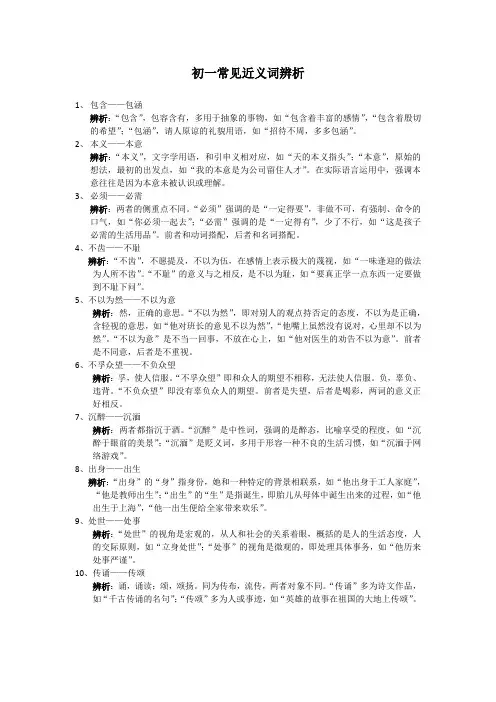
初一常见近义词辨析1、包含——包涵辨析:“包含”,包容含有,多用于抽象的事物,如“包含着丰富的感情”,“包含着殷切的希望”;“包涵”,请人原谅的礼貌用语,如“招待不周,多多包涵”。
2、本义——本意辨析:“本义”,文字学用语,和引申义相对应,如“天的本义指头”;“本意”,原始的想法,最初的出发点,如“我的本意是为公司留住人才”。
在实际语言运用中,强调本意往往是因为本意未被认识或理解。
3、必须——必需辨析:两者的侧重点不同。
“必须”强调的是“一定得要”,非做不可,有强制、命令的口气,如“你必须一起去”;“必需”强调的是“一定得有”,少了不行,如“这是孩子必需的生活用品”。
前者和动词搭配,后者和名词搭配。
4、不齿——不耻辨析:“不齿”,不愿提及,不以为伍,在感情上表示极大的蔑视,如“一味逢迎的做法为人所不齿”。
“不耻”的意义与之相反,是不以为耻,如“要真正学一点东西一定要做到不耻下问”。
5、不以为然——不以为意辨析:然,正确的意思。
“不以为然”,即对别人的观点持否定的态度,不以为是正确,含轻视的意思,如“他对班长的意见不以为然”,“他嘴上虽然没有说对,心里却不以为然”。
“不以为意”是不当一回事,不放在心上,如“他对医生的劝告不以为意”。
前者是不同意,后者是不重视。
6、不孚众望——不负众望辨析:孚,使人信服。
“不孚众望”即和众人的期望不相称,无法使人信服。
负,辜负、违背。
“不负众望”即没有辜负众人的期望。
前者是失望,后者是喝彩,两词的意义正好相反。
7、沉醉——沉湎辨析:两者都指沉于酒。
“沉醉”是中性词,强调的是醉态,比喻享受的程度,如“沉醉于眼前的美景”;“沉湎”是贬义词,多用于形容一种不良的生活习惯,如“沉湎于网络游戏”。
8、出身——出生辨析:“出身”的“身”指身份,她和一种特定的背景相联系,如“他出身于工人家庭”,“他是教师出生”;“出生”的“生”是指诞生,即胎儿从母体中诞生出来的过程,如“他出生于上海”,“他一出生便给全家带来欢乐”。
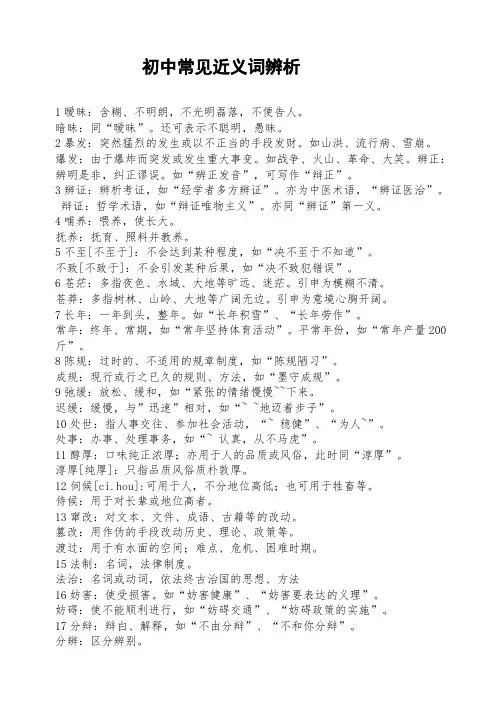
初中常见近义词辨析1暧昧:含糊、不明朗,不光明磊落,不便告人。
暗昧:同“暧昧”。
还可表示不聪明,愚昧。
2暴发:突然猛烈的发生或以不正当的手段发财。
如山洪、流行病、雪崩。
爆发:由于爆炸而突发或发生重大事变。
如战争、火山、革命、大笑。
辨正:辨明是非,纠正谬误。
如“辨正发音”,可写作“辩正”。
3辨证:辨析考证,如“经学者多方辨证”。
亦为中医术语,“辨证医治”。
辩证:哲学术语,如“辩证唯物主义”。
亦同“辨证”第一义。
4哺养:喂养,使长大。
抚养:抚育、照料并教养。
5不至[不至于]:不会达到某种程度,如“决不至于不知道”。
不致[不致于]:不会引发某种后果,如“决不致犯错误”。
6苍茫:多指夜色、水域、大地等旷远、迷茫。
引申为模糊不清。
苍莽:多指树林、山岭、大地等广阔无边。
引申为意境心胸开阔。
7长年:一年到头,整年。
如“长年积雪”、“长年劳作”。
常年:终年、常期,如“常年坚持体育活动”。
平常年份,如“常年产量200斤”。
8陈规:过时的、不适用的规章制度,如“陈规陋习”。
成规:现行或行之已久的规则、方法,如“墨守成规”。
9弛缓:放松、缓和,如“紧张的情绪慢慢~~下来。
迟缓:缓慢,与”迅速”相对,如“~ ~地迈着步子”。
10处世:指人事交往、参加社会活动,“~ 稳健”、“为人~”。
处事:办事、处理事务,如“~ 认真,从不马虎”。
11醇厚:口味纯正浓厚;亦用于人的品质或风俗,此时同“淳厚”。
淳厚[纯厚]:只指品质风俗质朴敦厚。
12伺候[ci.hou]:可用于人,不分地位高低;也可用于牲畜等。
侍候:用于对长辈或地位高者。
13窜改:对文本、文件、成语、古籍等的改动。
篡改:用作伪的手段改动历史、理论、政策等。
渡过:用于有水面的空间;难点、危机、困难时期。
15法制:名词,法律制度。
法治:名词或动词,依法终古治国的思想、方法16妨害:使受损害。
如“妨害健康”、“妨害要表达的义理”。
妨碍:使不能顺利进行,如“妨碍交通”、“妨碍政策的实施”。
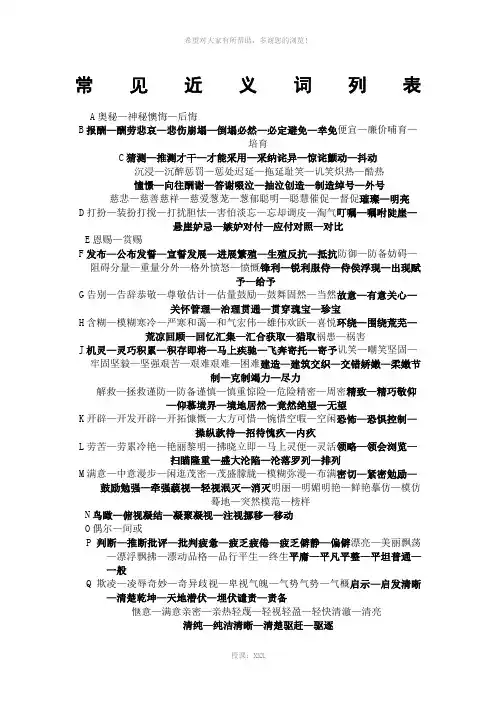
常见近义词列表A奥秘—神秘懊悔—后悔B报酬—酬劳悲哀—悲伤崩塌—倒塌必然—必定避免—幸免便宜—廉价哺育—培育C猜测—推测才干—才能采用—采纳诧异—惊诧颤动—抖动沉浸—沉醉惩罚—惩处迟延—拖延耻笑—讥笑炽热—酷热憧憬—向往酬谢—答谢啜泣—抽泣创造—制造绰号—外号慈悲—慈善慈祥—慈爱葱茏—葱郁聪明—聪慧催促—督促璀璨—明亮D打扮—装扮打搅—打扰胆怯—害怕淡忘—忘却调皮—淘气叮嘱—嘱咐陡崖—悬崖妒忌—嫉妒对付—应付对照—对比E恩赐—赏赐F发布—公布发誓—宣誓发展—进展繁殖—生殖反抗—抵抗防御—防备妨碍—阻碍分量—重量分外—格外愤怒—愤慨锋利—锐利服侍—侍侯浮现—出现赋予—给予G告别—告辞恭敬—尊敬估计—估量鼓励—鼓舞固然—当然故意—有意关心—关怀管理—治理贯通—贯穿瑰宝—珍宝H含糊—模糊寒冷—严寒和蔼—和气宏伟—雄伟欢跃—喜悦环绕—围绕荒芜—荒凉回顾—回忆汇集—汇合获取—猎取祸患—祸害J机灵—灵巧积累—积存即将—马上疾驰—飞奔寄托—寄予讥笑—嘲笑坚固—牢固坚毅—坚强艰苦—艰难艰难—困难建造—建筑交织—交错娇嫩—柔嫩节制—克制竭力—尽力解救—拯救谨防—防备谨慎—慎重惊险—危险精密—周密精致—精巧敬仰—仰慕境界—境地居然—竟然绝望—无望K开辟—开发开辟—开拓慷慨—大方可惜—惋惜空暇—空闲恐怖—恐惧控制—操纵款待—招待愧疚—内疚L劳苦—劳累冷艳—艳丽黎明—拂晓立即—马上灵便—灵活领略—领会浏览—扫瞄隆重—盛大沦陷—沦落罗列—排列M满意—中意漫步—闲逛茂密—茂盛朦胧—模糊弥漫—布满密切—紧密勉励—鼓励勉强—牵强藐视—轻视泯灭—消灭明丽—明媚明艳—鲜艳摹仿—模仿蓦地—突然模范—榜样N鸟瞰—俯视凝结—凝聚凝视—注视挪移—移动O偶尔—间或P判断—推断批评—批判疲惫—疲乏疲倦—疲乏僻静—偏僻漂亮—美丽飘荡—漂浮飘拂—漂动品格—品行平生—终生平庸—平凡平整—平坦普通—一般Q欺凌—凌辱奇妙—奇异歧视—卑视气魄—气势气势—气概启示—启发清晰—清楚乾坤—天地潜伏—埋伏谴责—责备惬意—满意亲密—亲热轻蔑—轻视轻盈—轻快清澈—清亮清纯—纯洁清晰—清楚驱赶—驱逐R弱小—微小S伤害—损害商议—商量商议—协商稍微—略微奢靡—奢侈神秘—神奇神奇—奇妙神奇—奇特审阅—批阅实用—有用舒畅—舒服思量—思考伺侯—侍奉肃静—安静素质—素养率先—领先T贪婪—贪欲探索—探究逃避—躲避特殊—特别誊写—抄写体面—风光体味—体会推荐—推举妥帖—稳妥W蜿蜒—曲折顽强—坚韧顽强—顽固宛然—仿佛宛如—犹如宛若—仿佛宛若—宛如巍峨—雄伟惟独—只有危急—危险尾随—跟随委托—托付温和—和气温和—温柔X吸收—汲取希翼—希望稀罕—希奇袭击—突击吓唬—恐吓鲜明—鲜亮羡慕—艳羡向来—一直消失—消逝歇息—休息欣赏—观赏新鲜—新奇兴旺—兴盛兴许—或许凶猛—凶狠雄伟—宏伟修筑—修建羞愧—惭愧秀媚—秀丽徐徐—缓缓寻常—平常寻觅—寻找Y延续—连续严重—严峻遥望—眺望要挟—挟制依然—依旧游览—巡游黝黑—乌黑幼稚—稚嫩预计—估计愿意—情愿允许—同意Z暂时—临时阻挠—阻止赞赏—欣赏赞叹—赞美责怪—责备占领—占据照射—照耀照应—照顾珍贵—宝贵镇静—冷静征服—制服拯救—挽救争执—争吵指望—盼望骤然—突然注视—凝视追寻—寻找捉弄—戏弄茁壮—健壮滋味—味道纵情—尽情阻塞—堵塞别具一格—独具匠心不可计数—不计其数风俗世情—风土人情毫不犹豫—坚决果断绞尽脑汁—费尽心机筋疲力尽—力倦神疲迥乎不同—绝然不同举世闻名—闻名遐迩聚精会神—全神贯注雷霆万钧—排山倒海络绎不绝—川流不息眉开眼笑—眉飞色舞目不转睛—聚精会神排山倒海—移山倒海疲惫不堪—筋疲力竭千磨万击—千锤百炼情不自禁—不由自主盛气凌人—不可一世随心所欲—为所欲为同心协力—同心同德无拘无束—自由自在喜不自胜—乐不可支腥风血雨—凄风苦雨一五一十—如数家珍依依不舍—恋恋不舍应有尽有—无奇不有朝夕与共—朝夕相处震耳欲聋—响彻云霄常见反义词列表前─后冷─热高─低进─退死─活公─私快─慢矛─盾强─弱轻─重明―暗缓─急松─紧好─坏美─丑善─恶是─非闲─忙来─去分─合存─亡动─静浓─淡偏─正饥─饱爱─恨升─降开─关始─终胖─瘦迎─送盈─亏真─假虚─实有─无雅─俗是─否稀─密粗─细东─西巧─拙恩─怨新─旧正─邪通─堵止─行古─今张─弛曲─直亮─暗亲─疏收─放输─赢逆─顺苦─甜忠─奸纵─横得─失南─北薄─厚哭─笑文─武推─拉问─答主─仆买─卖深─浅聚─散干─湿彼─此生─熟单─双首─末你─我敌─友警─匪盛─衰胜─败加─减软─硬阴─阳顺─逆反─正祸─福信─疑错─对藏─露老─少断─续钝─锐浓─淡雌─雄醒─睡止─行咸─淡正─歪大—小多—少上—下左—右前—后冷—热高—低进—退黑—白天—地男—女里—外死—活公—私快—慢矛—盾宽—窄强—弱轻—重缓—急松—紧好—坏美—丑善—恶是—非闲—忙来—去分—合存—亡动—静浓—淡偏—正饥—饱爱—恨升—降开—关始—终胖—瘦迎—送盈—亏真—假虚—实有—无雅—俗是—否稀—密粗—细东—西巧—拙恩—怨新—旧正—邪通—堵止—行古—今张—弛曲—直亮—暗亲—疏收—放输—赢逆—顺苦—甜忠—奸纵—横得—失南—北薄—厚哭—笑文—武推—拉问—答主—仆买—卖深—浅聚散干—湿彼—此生—熟单—双首—末你—我敌—友警—匪盛—衰胜—败加—减软—硬阴—阳顺—逆反—正祸—福信—疑错—对藏—露老少断—续钝—锐浓—淡雌—雄醒—睡止—行咸—淡正—歪深—浅窄—宽远―近高―低冷―热横―竖同—异浑—清无―有涨—降隐—现紧―松细―粗嫩―老凹―凸浮―沉凉―暖朝―暮轻―重矛--盾深---浅买---卖浓---淡善---恶明---暗涨—降隐—现深—浅窄—宽远―近高―低冷―热横―竖同—异浑—清正常─异常非凡─平凡特别─一般扫兴─高兴轻蔑─敬重开心─苦闷寻常─异常违背─遵循怀疑─相信强盛─衰败尊重─侮辱激烈─平静嘈杂─寂静美丽─丑陋信奉─背弃失信─守信率领─追随退化─进化凝结─溶解伟大─渺小聚拢─分散增添─减少活泼─呆板鲜艳─暗淡严寒─酷暑安谧─嘈杂温暖─凉爽柔和─严厉拒绝─同意清醒─糊涂荒芜─耕种清晰─浑浊坚强─软弱微云─浓云纯熟─生疏陌生─熟悉平坦─崎岖光滑─粗糙慎重─随便喜欢─厌恶痛快─难受幽静─喧闹崎岖─平坦刚强─软弱慌忙─镇定熟识─生疏伶俐─笨拙怕羞─大方镇定─慌张团结─分裂羞涩─大方严寒─炎热洒脱─拘谨明朗─阴沉沉重─轻盈迂回─径直清澈─浑浊脆弱─坚强饱满─干瘪衰弱─强健犹豫─坚定丰收─歉收复杂─简单淡妆─浓抹相宜─不宜自在─拘束平常─奇特勤劳─懒惰喜欢─讨厌密集─稀疏胜利─失败挺进─撤退宽敞─狭窄倾斜─竖直闻名─无名认识─陌生有趣─乏味舒畅─苦闷结束─开始紧张─轻松整齐─纷乱安全─危险撒谎─诚实慈祥─凶恶可爱─可恶紧张─轻松仔细─粗心附近─远方赞许─反对淡水─咸水高兴─难过飞快─缓慢精彩─平淡笨重─轻便紧张─松弛有趣─乏味听从─违抗诚实─虚伪承认─否认高兴─伤心起劲─没劲简单─复杂容易─困难熟练─生疏准确─错误温和─严厉暴躁─温和近处─远处气愤─欢喜粗心─细心美丽─丑陋洁白─乌黑高兴─痛苦宽阔─狭窄新款─陈旧兴旺─衰败团结─分裂敏捷─迟钝危险─安全常常─偶尔幼稚─老练含糊─清楚严重─轻微茂密─稀疏光明─黑暗微弱─强大杰出─平庸恶劣─良好灿烂─暗淡特殊─普通异常─平常简陋─豪华诚意─假意理屈─理直拒绝─接受惩罚─奖励迟延─提前示弱─逞强好心─恶意破碎─完整酥软─坚硬炎热─寒冷诚实─撒谎仔细─马虎聪明─愚笨空虚─充实伶俐─笨拙狭窄─宽阔晦暗─明亮勇敢─懦弱宽容─严格表扬─批评一向─偶尔善良─凶恶寂静─热闹聪明─愚笨穷苦─富裕精致─粗糙健康─虚弱忧虑─放心糟糕─精彩潮湿─干燥喜欢─讨厌危险─安全寂寞─喧闹奴隶─主人紧张─松弛统一─分裂繁荣─衰败精致─粗糙权利─义务愚笨—聪明安静—吵闹宽阔―狭窄平静―动荡加重―减轻缓慢―快速节省―浪费分散―聚拢茂盛—枯萎美丽—丑陋静寂—热闹清楚—模糊镇静—慌乱伸开—缩拢威武—沮丧巨大—细小神秘—平常原始—现代寒冷—炎热珍贵—普通丰年—歉年舒服―难受弯曲――笔直均匀―悬殊牢固―脆弱反面―正面伸出―缩回干燥―潮湿平坦―崎岖简单―复杂粗糙―细腻幸福―悲惨谦虚―骄傲快乐―伤心强健―软弱清澈―浑浊明白―糊涂茂密―稀疏成功―失败寒冷―温暖愤怒―高兴灵活―笨拙准许―拒绝热情―冷淡勤劳―懒惰分散—聚集迅速—迟钝认真—马虎失败—胜利犹豫—果断坚定—动摇膨大—缩小迟钝—灵活笨重—轻便临时―长期慎重―马虎柔弱―刚强光滑―粗糙静谧―热闹崭新―陈旧开始―结尾漂亮―丑陋喧闹―宁静容易―困难凋谢―盛开温暖―寒冷朋友―敌人山谷―山峰点燃―熄灭神奇―平常热闹―安静拽住―放开关心―冷漠高傲―谦逊郑重―轻率从容―慌张奢侈―寒酸敏捷―迟缓合上―打开老实―狡猾温柔―粗暴丰富―贫乏高兴―难过淘气―规矩讨厌―喜欢反抗―顺从忠厚―奸诈温暖―寒冷蜿蜒―笔直坚固―脆弱清楚―模糊陡峭―平坦伟大―渺小美丽―丑陋相同―不同古老―现代宏大―微小魁梧―矮小丰满―干瘪故人―新朋无名―有名满意―失望灿烂―暗淡凋零―盛开容易―困难希望―失望安全―危险可怜―可恨庄重―轻浮热情―冷淡坚强―懦弱宽裕―拮据神气―颓丧喜悦―忧伤快乐―悲伤繁华―萧条热闹―宁静褴褛―华丽踊跃―消极清晰―模糊仔细―粗心具体―大略温柔―粗暴危险―安全匆匆―慢慢认识―陌生疏远―亲近聪明―愚蠢长处―短处现代―古代依赖―自立美好―丑陋舒适―艰苦输入―输出陌生―熟悉打开―关闭凶猛―温和笨重―轻巧迟钝―灵敏相似―相反特殊―一般美妙―蹩脚优良―低劣勤劳―懒惰俊俏—丑陋轻快—沉重鲜艳—暗淡增添—削减活泼—呆板聚拢—分散停止—开始玲珑—粗笨灵活—呆板陡峭—平坦特殊—一般送行—迎接舒适—难受悲惨—幸福愈合—开裂有名—无名离开—回归害怕—勇敢忧伤—高兴飞快—缓慢成功—失败镇定--慌张严寒--温暖恶劣-优良湿润--干燥为难--容易激烈-平静狼狈--潇洒英勇--怯懦惬意—满意惊讶—吃惊危险—安全担心—放心朦胧—清楚高兴—难受便宜—昂贵喜欢—讨厌魁梧—矮小失望—绝望感激—感谢失望—期望紧张—松懈显赫—卑微朴素—奢华特殊—一般激动—平静蔑视—重视传统—现代亲近—疏远紧张—轻松坚强—软弱清楚—模糊富裕--贫穷接受--拒绝黎明--傍晚普通--特殊谦虚-骄傲坚硬--柔软公开--秘密宽阔―狭窄平静―动荡加重―减轻缓慢―快速节省―浪费分散―聚拢茂盛—枯萎美丽—丑陋静寂—热闹清楚—模糊镇静—慌乱伸开—缩拢威武—沮丧巨大—细小神秘—平常原始—现代寒冷—炎热珍贵—普通丰年—歉年舒服―难受弯曲―笔直均匀―悬殊牢固―脆弱新鲜―陈腐反面――正面伸出――缩回干燥――潮湿名副其实──名不副实雪中送炭──雪上加霜歪歪斜斜──端端正正人声鼎沸――鸦雀无声风平浪静──狂风恶浪迷迷糊糊──清清楚楚全神贯注──心不在焉断断续续──连续不断赏心悦目──触目惊心一丝不苟──粗心大意力倦神疲──精力充沛万马奔腾──无声无息暖暖和和──冷冷清清吞吞吐吐──干干脆脆毫不犹豫──犹豫不决别具一格──普普通通熙熙攘攘──冷冷清清心惊肉跳──镇定自如理直气壮──理屈词穷一朝一夕──日久天长悔过自新──执迷不悟群策群力──孤掌难鸣废寝忘食──饱食终日沸沸扬扬──鸦雀无声翻来覆去──简单明了吵吵嚷嚷──冷冷清清唇枪舌剑──心平气和粗制滥造──精雕细刻安居乐业──颠沛流离风平浪静—风号浪吼一模一样—截然不同柳暗花明—山穷水尽勤勤恳恳――懒懒散散享誉世界――默默无闻相背而行――相向而行恍然大悟――百思不解筋疲力尽――精神抖擞端端正正--歪歪斜斜筋疲力尽——干劲十足含有反义词的成语翻来覆去顾此失彼厚此薄彼虎头蛇尾街头巷尾继往开来扬长避短说长道短三长两短截长补短取长补短今是昨非口是心非似是而非空前绝后除旧布新你死我活拈轻怕重弄假成真七上八下完整无缺借古讽今避重就轻头重脚轻积少成多尺短寸长瞻前顾后同甘共苦声东击西喜新厌旧凶多吉少眼高手低假公济私惩前毖后自始至终返老还童争先恐后转败为胜开天辟地惊天动地顶天立地花天酒地前仰后合天罗地网经天纬地欢天喜地改天换地翻天覆地(注:可编辑下载,若有不当之处,请指正,谢谢!)。
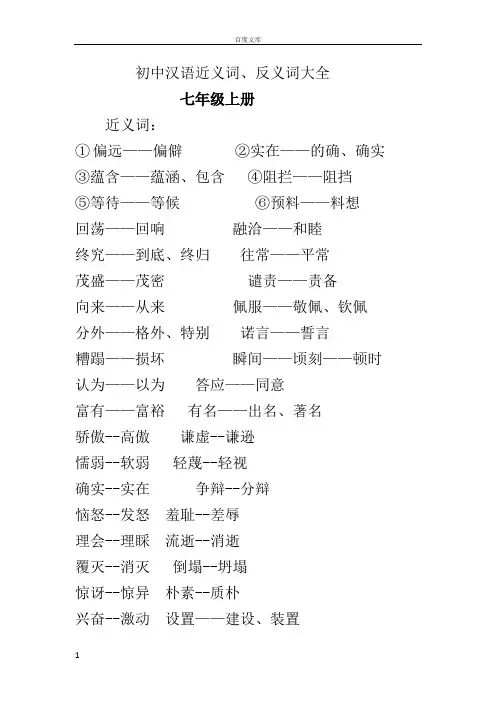
初中汉语近义词、反义词大全七年级上册近义词:①偏远——偏僻②实在——的确、确实③蕴含——蕴涵、包含④阻拦——阻挡⑤等待——等候⑥预料——料想回荡——回响融洽——和睦终究——到底、终归往常——平常茂盛——茂密谴责——责备向来——从来佩服——敬佩、钦佩分外——格外、特别诺言——誓言糟蹋——损坏瞬间——顷刻——顿时认为——以为答应——同意富有——富裕有名——出名、著名骄傲--高傲谦虚--谦逊懦弱--软弱轻蔑--轻视确实--实在争辩--分辩恼怒--发怒羞耻--差辱理会--理睬流逝--消逝覆灭--消灭倒塌--坍塌惊讶--惊异朴素--质朴兴奋--激动设置——建设、装置节约——节俭汇聚——集合呈现——显出美丽——漂亮消灭——消亡起色——好转尊重——敬重、尊敬简单——简易宣布——宣告维持——保持及时——按时特殊——特别根据——依据发现——发觉开拓——开辟、拓展、开发启示——启发、启迪本领——本事灾害——灾难区别——差别严肃——严厉兴趣——爱好用途——用处装束——装扮训导——教导相通——相联透露——泄露故意——有意诧异——惊异大约——大概体验——体会烦闷——苦闷顽强——坚强愤怒——震怒抱怨——埋怨颓废——衰颓叮嘱——嘱咐寻思——考虑随手——顺手嗔怪——责怪弥漫——弥散立即——立刻为难——刁难溢——满欣慰——宽慰享受——享乐反义词:激动——平静天真——成熟同意——拒绝枯燥——有趣骄傲--谦虚懦弱--坚强羞耻--光彩傲慢--谦恭朴素--奢华兴奋--镇静轻巧——笨重单调——丰富聚热——散热凶恶——善良丰收—欠收减少——增加弱小——强大片面——全面复杂——简单永恒——短暂特殊——平常聚集——分散勤奋——懒惰伟大——渺小保存——破坏危险——安全主要——次要提高——降低密集——分散昂贵——低贱笨拙——机灵缩着——伸出坚硬——柔软沉闷——活跃迷惑——清楚聚集——散开污染——清洁喜欢——讨厌特殊——普通担心——放心勤奋——懒惰平常——反常、特别柔软——坚硬糊涂——清醒合拢——张开名不副实——名副其实特殊——普通反常——平常有趣——枯燥、乏味、无聊敏捷——迟钝、笨拙肯定——否定、怀疑崭新——陈旧七年级下册近义词:悠久——悠长优越——优胜沉默——沉寂郑重——慎重忽然——突然责备——责怪宁愿——宁可震撼——震惊赶忙——赶快阻挡——阻止昔日——往日猛然——突然赶紧——赶快坚定——坚决四周——周围依然——依旧稳定——稳固剧烈——猛烈即将——将要迟疑——犹豫召开——召集安顿——安排挖掘——发掘无比——非常气质——风度评论——评议特地——专门缘故——原因尊重——尊敬放弃——抛弃考虑——思考收集——搜集亲昵——亲密谅解——原谅朦胧——模糊离别——分别崎岖——坎坷失望——绝望匆忙——急忙坦诚——坦白呆板——古板忙碌——忙活疲倦——疲乏停歇——停止专心——用心狼藉——凌乱赞叹——称赞精心——细心表达——表示固定——稳定离别——分别散乱——凌乱大概——大致天然——自然瞩目——注目从容——镇定稳健——稳重浩瀚——辽阔风采——风度选拔——挑选具备——具有鲜艳——艳丽自豪——骄傲注视——瞩目蕴含——蕴涵、包含庄重——庄严期待——期望恰当——合适辽阔——广阔阻挡——阻拦包括——包含吸收——吸取特有——独有凉爽——凉快遮盖——掩盖潮湿——湿润阻挡——阻拦稀薄——稀少终年——常年贤惠——贤淑和气——和蔼淘气——顽皮封闭——封住宽容——宽宏纠纷——矛盾迷迷糊糊——糊里糊涂倘若——假如舒适——舒服疲乏——疲倦浑身——全身回想——回忆胡说——乱说确切——确实、准确为难——刁难赶造——赶制推辞——拒绝耽误——耽搁只管——尽管轻易——随便懊悔——后悔暗暗——默默才干——才能靠近——接近繁衍——繁殖较真——认真简易——简单牵动——牵挂欺负——欺凌建议——意见搬迁——搬移推测——推理偏僻——偏远夸奖——表扬方式——方法精心——用心痛快——爽快本事——本领赖以——依靠昏昏沉沉——迷迷糊糊嘱托——嘱咐盼望——期望偶然——偶尔慷慨——大方放弃——抛弃、丢弃收集——搜集、汇集终究——始终繁殖——繁衍本领——本事辨别——辨认厌恶——讨厌特殊——特别霸占——侵占敏捷——灵敏观赏——欣赏反义词:自卑——自信希望——失望奉献——索取激动——平静热情——冷漠朴实——奸诈茂盛——枯萎艰辛——安逸自卑——自信成功——失败难过——高兴失常——正常批评——赞扬冷清——繁华瘦弱——强壮轻率——郑重类似——差异严谨——随便、草率生动——死板公布——隐瞒、保密强烈——微弱凉爽——酷热来不及——来得及秘密——公开炎热——寒冷狭小——宽广清晰—模糊减少——增加降低——升高保护——损坏敏捷——迟钝、笨拙八年级上册听从——服从强壮——结实——健壮——强健信服——佩服按照——依照聪明——聪慧漂亮——美丽温暖——暖和马上——赶快忽然——突然痛快——畅快慷慨——大方凶狠——凶恶仿佛——好像、似乎赞美——称赞馈赠——赠送必然——一定寻思——思考平淡——平常叮嘱——嘱咐依照——依从勤恳——勤劳强健——健壮视察——检查——察看纯正——纯粹稀有——稀少、稀缺、稀奇吝啬——小气稀稀拉拉——稀疏点评——评论阿谀——奉承、讨好入迷——着迷、入神往往——经常高贵——宝贵萎缩——枯萎估量——估计热忱——热情嘈杂——杂乱、喧闹清晰——清楚汇集——聚集装点——装饰照样——照旧燥热——清凉阴凉——炎热万万——绝对、完全消逝——消失劝告——劝说侵害——伤害赶忙——赶快——赶紧按期——如期耽搁——耽误喧嚣——喧闹占据——占领以致——以至反义词:勤劳——懒惰强健—病弱、瘦弱富裕——富有光景——境况怀念——思念舒服——难受脆弱——坚强、刚强空虚——充实悲剧——喜剧轻盈——笨重、沉重偏僻——繁华、热闹朦朦胧胧——清清楚楚八年级下册赊——欠窥视——窥探款式——样式、格式单独——独自蹊跷——奇怪疑惑——迷惑特别——特殊认真——仔细常常——时常少见——稀有收藏——珍藏精巧——精致焦急——着急珍惜——爱惜体验——体会损毁——毁坏被动——主动防范——防备——警惕悲痛——伤心脱离——离开掩饰——掩盖秀气——清秀见证——作证刻意——有意忌妒——嫉妒粗犷——粗豪清冽——清冷跨越——越过壮丽——壮美便利——方便熟识——熟悉富足——富裕开辟——开创相接——相连浩大——广大专门——特别注重——注意收获——丰收、收益踪迹——痕迹规格——标准实行——施行伫立——站立守卫——保卫惋惜——可惜迁移——移动迹象——踪迹稀少——稀疏抗拒——抵抗、拒绝紧迫——急迫乃至——甚至反义词:陌生——陌生不悦——喜悦想念——遗忘异样——一样故意——无意仔细——粗心安静——噪杂湿润——干燥存在——消亡、消失软弱——坚强善良——凶恶茂密——稀疏危险——安全忙碌——清闲陈旧——崭新精细——细致紧密——稀疏缓慢——快速注意——留意控制——掌控九年级特意——特地及其——极为、极端、极度稀奇——稀少、新奇冒失——轻率拜托——委托讨教——请教、求教热爱——喜爱沉醉——陶醉宁静——安静精巧——精致古怪——怪异吃力——费劲和蔼——和气暖和——温暖取代——代替音信——消息学识——学问呼应——照应耸立——直立、矗立预兆——先兆制造——制作坚实——坚固完备——齐备相近——近似畏惧——恐惧溶解——融化结局——结果巧合——恰巧先兆——预兆贸然——轻率颁布——公布实施——实行不愧——无愧根据——依据设想——假设美观——美丽注视——凝视犹豫——迟疑光阴——时光、岁月牢靠——可靠大意——疏忽利索——敏捷积淀——积累回顾——回想延误——拖延、耽误赞成——同意迫切——急切突破——打破恐惧——惧怕高明——高超渺小——微小预料——预想摧毁——毁灭不过——仅仅打交道——来往落伍——掉队省得——免得虚拟——虚构辅助——协助有幸——幸运维修——维护直观——直觉偏袒——偏心感召——感化名流——名人沮丧——失望公正——公平欺侮——欺辱歧视——蔑视交替——轮流闲聊——闲谈告诫——劝诫教化——感化家当——家产温馨——温暖亲昵——亲密索性——干脆残害——杀害气愤——愤恨识破——看穿胡说——乱说抵挡——抵抗防备——戒备怨恨——痛恨洽谈——商谈指望——期望、盼望总归——终究底细——内情不赖——不差劝说——劝解塌陷——倒塌悔改——悔悟家眷——家属违背——违反疲惫——疲倦、疲乏幽暗——昏暗混杂——混乱寻觅——寻找知晓——知道重复——反复鞭策——鼓舞抛弃——丢弃获益匪浅——受益非浅得益非浅期待——期望惊讶——惊奇妒嫉——妒忌罢手——住手如法炮制——依样画瓢变迁——变化气概——气魄非凡——非常终止——停止唯独——只有羞耻——羞辱蹊跷——奇怪倘若——假如留意——注意托付——委托安顿——安排慎重——郑重恐吓——威胁打听——探问延伸——延长反义词:清新——污浊宽敞——狭窄宽大——窄小存在——消亡、消失安静——噪杂湿润——干燥滋润——枯燥凶恶——和善消亡——生长萎缩——蓬勃冷清——热闹陌生——熟悉惊慌——镇静笨重——轻巧歧视——尊重抛弃——收留获益匪浅——一无所获如法炮制——独出心裁温存——粗暴慎重——草率羞耻——光彩。
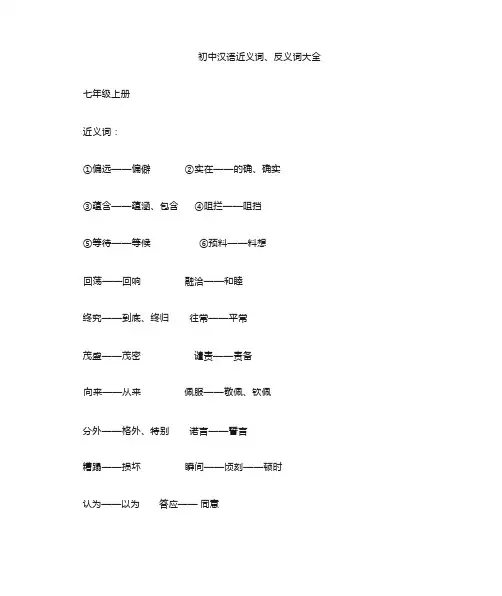
七年级上册近义词:①偏远——偏僻③蕴含——蕴涵、包含⑤等待——等候回荡——回响终究——到底、终归茂盛——茂密向来——从来初中汉语近义词、反义词大全②实在——的确、确实④阻拦——阻挡⑥预料——料想融洽——和睦往常——平常谴责——责备佩服——敬佩、钦佩分外——格外、特别糟蹋——损坏诺言——誓言瞬间——顷刻——顿时认为——以为答应——同意富有——富裕有名——出名、著名骄傲-- 高傲懦弱--软弱确实--实在恼怒--发怒理会--理睬覆灭--消灭惊讶--惊异兴奋--激动谦虚--谦逊轻蔑--轻视争辩--分辩羞耻--差辱流逝--消逝倒塌--坍塌朴素--质朴设置——建设、装置节约——节俭呈现——显出消灭——消亡汇聚——集合美丽——漂亮起色——好转尊重——敬重、尊敬简单——简易宣布——宣告及时——按时根据——依据维持——保持特殊——特别发现——发觉开拓——开辟、拓展、开发启示——启发、启迪本领——本事区别——差别兴趣——爱好装束——装扮相通——相联故意——有意大约——大概烦闷——苦闷愤怒——震怒灾害——灾难严肃——严厉用途——用处训导——教导透露——泄露诧异——惊异体验——体会顽强——坚强抱怨——埋怨颓废——衰颓寻思——考虑嗔怪——责怪立即——立刻溢——满享受——享乐反义词:激动——平静同意——拒绝骄傲--谦虚羞耻--光彩朴素--奢华轻巧——笨重叮嘱——嘱咐随手——顺手弥漫——弥散为难——刁难欣慰——宽慰天真——成熟枯燥——有趣懦弱--坚强傲慢--谦恭兴奋--镇静单调——丰富聚热——散热丰收—欠收弱小——强大复杂——简单特殊——平常勤奋——懒惰保存——破坏主要——次要密集——分散笨拙——机灵坚硬——柔软迷惑——清楚污染——清洁凶恶——善良减少——增加片面——全面永恒——短暂聚集——分散伟大——渺小危险——安全提高——降低昂贵——低贱缩着——伸出沉闷——活跃聚集——散开喜欢——讨厌特殊——普通担心——放心勤奋——懒惰平常——反常、特别柔软——坚硬糊涂——清醒合拢——张开名不副实——名副其实特殊——普通反常——平常有趣——枯燥、乏味、无聊敏捷——迟钝、笨拙肯定——否定、怀疑崭新——陈旧七年级下册近义词:悠久——悠长沉默——沉寂忽然——突然宁愿——宁可优越——优胜郑重——慎重责备——责怪震撼——震惊赶忙——赶快昔日——往日赶紧——赶快四周——周围稳定——稳固即将——将要召开——召集挖掘——发掘气质——风度特地——专门尊重——尊敬考虑——思考亲昵——亲密阻挡——阻止猛然——突然坚定——坚决依然——依旧剧烈——猛烈迟疑——犹豫安顿——安排无比——非常评论——评议缘故——原因放弃——抛弃收集——搜集谅解——原谅朦胧——模糊崎岖——坎坷匆忙——急忙呆板——古板疲倦——疲乏专心——用心赞叹——称赞表达——表示离别——分别大概——大致瞩目——注目稳健——稳重风采——风度离别——分别失望——绝望坦诚——坦白忙碌——忙活停歇——停止狼藉——凌乱精心——细心固定——稳定散乱——凌乱天然——自然从容——镇定浩瀚——辽阔选拔——挑选具备——具有鲜艳——艳丽自豪——骄傲注视——瞩目蕴含——蕴涵、包含庄重——庄严期待——期望恰当——合适阻挡——阻拦吸收——吸取凉爽——凉快潮湿——湿润稀薄——稀少贤惠——贤淑淘气——顽皮宽容——宽宏辽阔——广阔包括——包含特有——独有遮盖——掩盖阻挡——阻拦终年——常年和气——和蔼封闭——封住纠纷——矛盾迷迷糊糊——糊里糊涂倘若——假如舒适——舒服疲乏——疲倦浑身——全身回想——回忆胡说——乱说确切——确实、准确为难——刁难赶造——赶制推辞——拒绝耽误——耽搁只管——尽管轻易——随便懊悔——后悔暗暗——默默才干——才能靠近——接近繁衍——繁殖较真——认真简易——简单牵动——牵挂欺负——欺凌建议——意见搬迁——搬移推测——推理偏僻——偏远夸奖——表扬方式——方法精心——用心痛快——爽快本事——本领赖以——依靠昏昏沉沉——迷迷糊糊嘱托——嘱咐盼望——期望偶然——偶尔慷慨——大方放弃——抛弃、丢弃收集——搜集、汇集终究——始终本领——本事厌恶——讨厌霸占——侵占观赏——欣赏繁殖——繁衍辨别——辨认特殊——特别敏捷——灵敏反义词:自卑——自信奉献——索取热情——冷漠茂盛——枯萎自卑——自信难过——高兴批评——赞扬瘦弱——强壮类似——差异生动——死板强烈——微弱希望——失望激动——平静朴实——奸诈艰辛——安逸成功——失败失常——正常冷清——繁华轻率——郑重严谨——随便、草率公布——隐瞒、保密凉爽——酷热来不及——来得及秘密——公开炎热——寒冷狭小——宽广清晰—模糊减少——增加降低——升高保护——损坏敏捷——迟钝、笨拙八年级上册听从——服从信服——佩服聪明——聪慧温暖——暖和忽然——突然慷慨——大方强壮——结实——健壮——强健按照——依照漂亮——美丽马上——赶快痛快——畅快凶狠——凶恶仿佛——好像、似乎赞美——称赞馈赠——赠送寻思——思考必然——一定平淡——平常叮嘱——嘱咐依照——依从勤恳——勤劳强健——健壮视察——检查——察看纯正——纯粹稀有——稀少、稀缺、稀奇吝啬——小气稀稀拉拉——稀疏阿谀——奉承、讨好点评——评论入迷——着迷、入神往往——经常萎缩——枯萎热忱——热情清晰——清楚装点——装饰燥热——清凉高贵——宝贵估量——估计嘈杂——杂乱、喧闹汇集——聚集照样——照旧阴凉——炎热万万——绝对、完全消逝——消失劝告——劝说侵害——伤害赶忙——赶快——赶紧按期——如期耽搁——耽误喧嚣——喧闹占据——占领以致——以至反义词:勤劳——懒惰强健—病弱、瘦弱富裕——富有光景——境况怀念——思念舒服——难受脆弱——坚强、刚强空虚——充实悲剧——喜剧轻盈——笨重、沉重偏僻——繁华、热闹朦朦胧胧——清清楚楚八年级下册赊——欠窥视——窥探款式——样式、格式单独——独自蹊跷——奇怪疑惑——迷惑特别——特殊认真——仔细常常——时常少见——稀有收藏——珍藏精巧——精致焦急——着急珍惜——爱惜体验——体会损毁——毁坏被动——主动防范——防备——警惕悲痛——伤心脱离——离开掩饰——掩盖秀气——清秀见证——作证刻意——有意忌妒——嫉妒粗犷——粗豪清冽——清冷跨越——越过壮丽——壮美便利——方便熟识——熟悉富足——富裕开辟——开创相接——相连浩大——广大专门——特别注重——注意收获——丰收、收益踪迹——痕迹规格——标准实行——施行伫立——站立守卫——保卫惋惜——可惜迁移——移动迹象——踪迹稀少——稀疏抗拒——抵抗、拒绝乃至——甚至紧迫——急迫反义词:陌生——陌生不悦——喜悦想念——遗忘故意——无意安静——噪杂异样——一样仔细——粗心湿润——干燥存在——消亡、消失软弱——坚强善良——凶恶危险——安全陈旧——崭新紧密——稀疏注意——留意茂密——稀疏忙碌——清闲精细——细致缓慢——快速控制——掌控九年级特意——特地及其——极为、极端、极度稀奇——稀少、新奇冒失——轻率拜托——委托讨教——请教、求教热爱——喜爱沉醉——陶醉宁静——安静精巧——精致古怪——怪异吃力——费劲和蔼——和气暖和——温暖取代——代替音信——消息学识——学问呼应——照应耸立——直立、矗立预兆——先兆制造——制作完备——齐备畏惧——恐惧结局——结果先兆——预兆坚实——坚固相近——近似溶解——融化巧合——恰巧贸然——轻率颁布——公布不愧——无愧设想——假设注视——凝视实施——实行根据——依据美观——美丽犹豫——迟疑光阴——时光、岁月牢靠——可靠大意——疏忽利索——敏捷积淀——积累回顾——回想延误——拖延、耽误赞成——同意迫切——急切恐惧——惧怕渺小——微小摧毁——毁灭打交道——来往突破——打破高明——高超预料——预想不过——仅仅落伍——掉队省得——免得辅助——协助维修——维护偏袒——偏心名流——名人公正——公平歧视——蔑视闲聊——闲谈教化——感化温馨——温暖索性——干脆气愤——愤恨胡说——乱说虚拟——虚构有幸——幸运直观——直觉感召——感化沮丧——失望欺侮——欺辱交替——轮流告诫——劝诫家当——家产亲昵——亲密残害——杀害识破——看穿抵挡——抵抗防备——戒备洽谈——商谈总归——终究不赖——不差塌陷——倒塌家眷——家属怨恨——痛恨指望——期望、盼望底细——内情劝说——劝解悔改——悔悟违背——违反疲惫——疲倦、疲乏幽暗——昏暗混杂——混乱知晓——知道鞭策——鼓舞寻觅——寻找重复——反复抛弃——丢弃获益匪浅——受益非浅得益非浅期待——期望妒嫉——妒忌惊讶——惊奇罢手——住手如法炮制——依样画瓢变迁——变化气概——气魄非凡——非常终止——停止唯独——只有羞耻——羞辱蹊跷——奇怪倘若——假如留意——注意托付——委托安顿——安排慎重——郑重恐吓——威胁打听——探问延伸——延长反义词:清新——污浊宽敞——狭窄宽大——窄小存在——消亡、消失安静——噪杂湿润——干燥滋润——枯燥凶恶——和善消亡——生长冷清——热闹惊慌——镇静歧视——尊重萎缩——蓬勃陌生——熟悉笨重——轻巧抛弃——收留获益匪浅——一无所获如法炮制——独出心裁温存——粗暴慎重——草率羞耻——光彩。
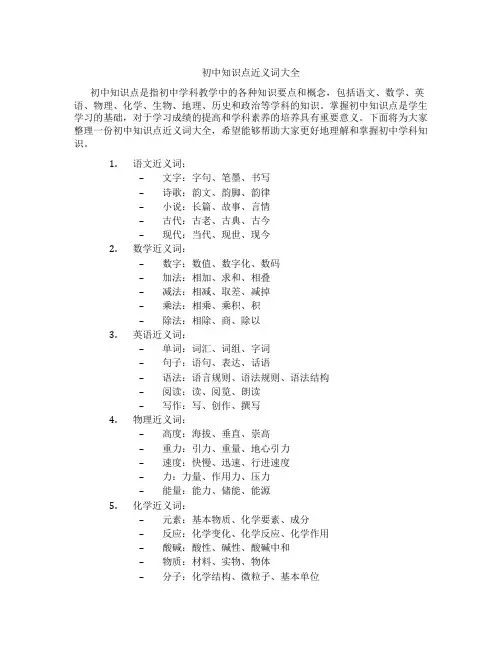
初中知识点近义词大全初中知识点是指初中学科教学中的各种知识要点和概念,包括语文、数学、英语、物理、化学、生物、地理、历史和政治等学科的知识。
掌握初中知识点是学生学习的基础,对于学习成绩的提高和学科素养的培养具有重要意义。
下面将为大家整理一份初中知识点近义词大全,希望能够帮助大家更好地理解和掌握初中学科知识。
1.语文近义词:–文字:字句、笔墨、书写–诗歌:韵文、韵脚、韵律–小说:长篇、故事、言情–古代:古老、古典、古今–现代:当代、现世、现今2.数学近义词:–数字:数值、数字化、数码–加法:相加、求和、相叠–减法:相减、取差、减掉–乘法:相乘、乘积、积–除法:相除、商、除以3.英语近义词:–单词:词汇、词组、字词–句子:语句、表达、话语–语法:语言规则、语法规则、语法结构–阅读:读、阅览、朗读–写作:写、创作、撰写4.物理近义词:–高度:海拔、垂直、崇高–重力:引力、重量、地心引力–速度:快慢、迅速、行进速度–力:力量、作用力、压力–能量:能力、储能、能源5.化学近义词:–元素:基本物质、化学要素、成分–反应:化学变化、化学反应、化学作用–酸碱:酸性、碱性、酸碱中和–物质:材料、实物、物体–分子:化学结构、微粒子、基本单位6.生物近义词:–动物:生物、动植物、生命体–植物:植被、绿色植物、草木–细胞:细胞体、细胞膜、细胞核–生长:发育、成长、生物生长–繁殖:繁衍、生殖、繁育7.地理近义词:–地球:地球球体、地壳、地球之星–水系:水流、水道、河流–山脉:山地、山系、山链–气候:天气、气象、气候变化–自然:大自然、自然界、自然环境8.历史近义词:–朝代:王朝、时代、年代–文化:文明、文化瑰宝、文化遗产–政权:政权机构、政治统治、统治集团–革命:变革、改革、革命斗争–历史事件:历史事迹、历史发展、历次事件9.政治近义词:–国家:国土、国民、国家机构–政府:政权、执政团体、执政党–民主:人民当家作主、民主制度、民主权利–科学社会主义:马克思主义、共产主义、社会主义–思想道德:思想品德、道德规范、道德准则这些近义词帮助我们更好地理解和记忆初中学科知识,同时也拓宽了我们的词汇量,让我们能够更准确地描述和表达自己的想法。
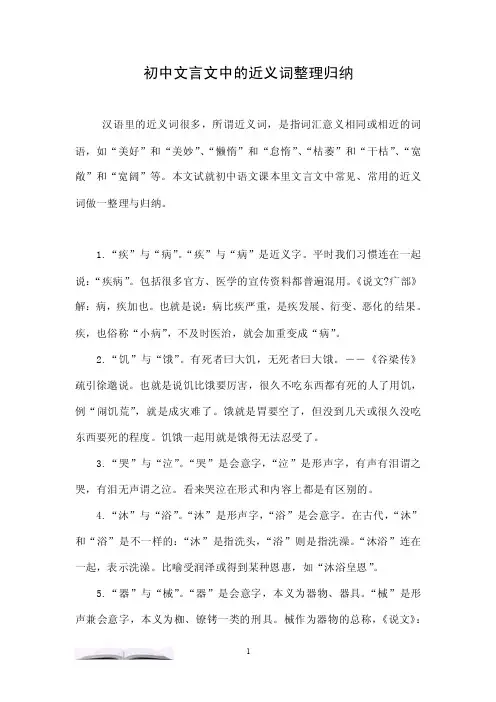
初中文言文中的近义词整理归纳汉语里的近义词很多,所谓近义词,是指词汇意义相同或相近的词语,如“美好”和“美妙”、“懒惰”和“怠惰”、“枯萎”和“干枯”、“宽敞”和“宽阔”等。
本文试就初中语文课本里文言文中常见、常用的近义词做一整理与归纳。
1.“疾”与“病”。
“疾”与“病”是近义字。
平时我们习惯连在一起说:“疾病”。
包括很多官方、医学的宣传资料都普遍混用。
《说文?疒部》解:病,疾加也。
也就是说:病比疾严重,是疾发展、衍变、恶化的结果。
疾,也俗称“小病”,不及时医治,就会加重变成“病”。
2.“饥”与“饿”。
有死者曰大饥,无死者曰大饿。
――《谷梁传》疏引徐邈说。
也就是说饥比饿要厉害,很久不吃东西都有死的人了用饥,例“闹饥荒”,就是成灾难了。
饿就是胃要空了,但没到几天或很久没吃东西要死的程度。
饥饿一起用就是饿得无法忍受了。
3.“哭”与“泣”。
“哭”是会意字,“泣”是形声字,有声有泪谓之哭,有泪无声谓之泣。
看来哭泣在形式和内容上都是有区别的。
4.“沐”与“浴”。
“沐”是形声字,“浴”是会意字。
在古代,“沐”和“浴”是不一样的:“沐”是指洗头,“浴”则是指洗澡。
“沐浴”连在一起,表示洗澡。
比喻受润泽或得到某种恩惠,如“沐浴皇恩”。
5.“器”与“械”。
“器”是会意字,本义为器物、器具。
“械”是形声兼会意字,本义为枷、镣铐一类的刑具。
械作为器物的总称,《说文》:“有盛为械,无盛为器。
”是说,有盛物的构件叫械,没有盛物的构件叫器。
6.“薪”与“柴”。
这二字都是形声字,区别如《礼记?月令》:“大者可析谓之薪,小者合束谓之柴。
”7.“赋”与“税”。
“赋”在古代有特定的含义。
“税”收产生初期用来满足军事需要征收的军需品叫作赋。
如征用的兵车、武器、衣甲等。
所以赋字由“贝”加“武”二字组成,即货币用于战争的意思。
而中国古代的税最早是指对土地产品和工商业的征收。
用于国家一般经费。
如《汉书?刑法志》记载:有税有赋,税以足食,赋以足兵。
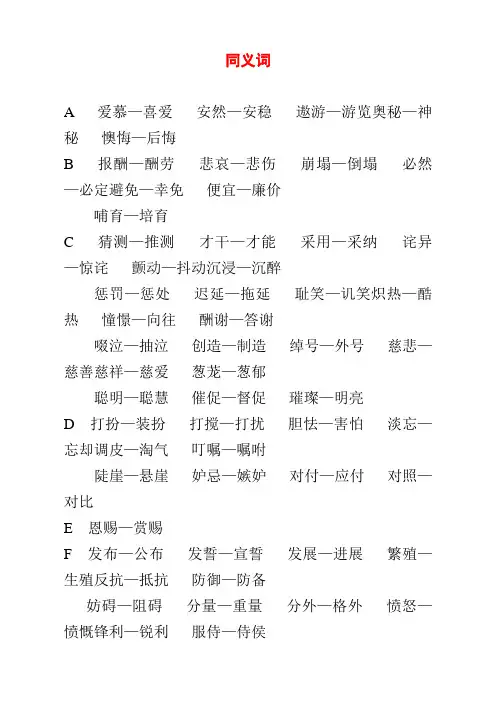
同义词A 爱慕—喜爱安然—安稳遨游—游览奥秘—神秘懊悔—后悔B 报酬—酬劳悲哀—悲伤崩塌—倒塌必然—必定避免—幸免便宜—廉价哺育—培育C 猜测—推测才干—才能采用—采纳诧异—惊诧颤动—抖动沉浸—沉醉惩罚—惩处迟延—拖延耻笑—讥笑炽热—酷热憧憬—向往酬谢—答谢啜泣—抽泣创造—制造绰号—外号慈悲—慈善慈祥—慈爱葱茏—葱郁聪明—聪慧催促—督促璀璨—明亮D 打扮—装扮打搅—打扰胆怯—害怕淡忘—忘却调皮—淘气叮嘱—嘱咐陡崖—悬崖妒忌—嫉妒对付—应付对照—对比E 恩赐—赏赐F 发布—公布发誓—宣誓发展—进展繁殖—生殖反抗—抵抗防御—防备妨碍—阻碍分量—重量分外—格外愤怒—愤慨锋利—锐利服侍—侍侯浮现—出现赋予—给予G 告别—告辞恭敬—尊敬估计—估量鼓励—鼓舞固然—当然故意—有意关心—关怀管理—治理贯通—贯穿瑰宝—珍宝H 含糊—模糊寒冷—严寒和蔼—和气宏伟—雄伟欢跃—喜悦环绕—围绕荒芜—荒凉回顾—回忆汇集—汇合获取—猎取祸患—祸害J 机灵—灵巧积累—积存即将—马上疾驰—飞奔寄托—寄予讥笑—嘲笑坚固—牢固坚毅—坚强艰苦—艰难艰难—困难建造—建筑交织—交错娇嫩—柔嫩节制—克制竭力—尽力解救—拯救谨防—防备谨慎—慎重惊险—危险精密—周密精致—精巧敬仰—仰慕境界—境地居然—竟然绝望—无望K 开辟—开发开辟—开拓慷慨—大方可惜—惋惜空暇—空闲恐怖—恐惧控制—操纵款待—招待愧疚—内疚L 劳苦—劳累冷艳—艳丽黎明—拂晓立即—马上灵便—灵活领略—领会浏览—扫瞄隆重—盛大沦陷—沦落罗列—排列M 满意—中意漫步—闲逛茂密—茂盛朦胧—模糊弥漫—布满密切—紧密勉励—鼓励勉强—牵强藐视—轻视泯灭—消灭明丽—明媚明艳—鲜艳摹仿—模仿蓦地—突然模范—榜样N 鸟瞰—俯视凝结—凝聚凝视—注视挪移—移动O 偶尔—间或P 判断—推断批评—批判疲惫—疲乏疲倦—疲乏僻静—偏僻漂亮—美丽飘荡—漂浮飘拂—漂动品格—品行平生—终生平庸—平凡平整—平坦普通—一般Q 欺凌—凌辱奇妙—奇异歧视—卑视气魄—气势气势—气概启示—启发清晰—清楚乾坤—天地潜伏—埋伏谴责—责备惬意—满意亲密—亲热轻蔑—轻视轻盈—轻快清澈—清亮清纯—纯洁清晰—清楚驱赶—驱逐R 弱小—微小S 伤害—损害商议—商量商议—协商稍微—略微奢靡—奢侈神秘—神奇神奇—奇妙神奇—奇特审阅—批阅实用—有用舒畅—舒服思量—思考伺侯—侍奉肃静—安静素质—素养率先—领先T 贪婪—贪欲探索—探究逃避—躲避特殊—特别誊写—抄写体面—风光体味—体会推荐—推举妥帖—稳妥W 蜿蜒—曲折顽强—坚韧顽强—顽固宛然—仿佛宛如—犹如宛若—仿佛宛若—宛如巍峨—雄伟惟独—只有危急—危险尾随—跟随委托—托付温和—和气温和—温柔X 吸收—汲取希翼—希望稀罕—希奇袭击—突击吓唬—恐吓鲜明—鲜亮羡慕—艳羡向来—一直消失—消逝歇息—休息欣赏—观赏新鲜—新奇兴旺—兴盛兴许—或许凶猛—凶狠雄伟—宏伟修筑—修建羞愧—惭愧秀媚—秀丽徐徐—缓缓寻常—平常寻觅—寻找Y 延续—连续严重—严峻遥望—眺望要挟—挟制依然—依旧游览—巡游黝黑—乌黑幼稚—稚嫩预计—估计愿意—情愿允许—同意Z 暂时—临时阻挠—阻止赞赏—欣赏赞叹—赞美责怪—责备占领—占据照射—照耀照应—照顾珍贵—宝贵镇静—冷静征服—制服拯救—挽救争执—争吵指望—盼望骤然—突然注视—凝视追寻—寻找捉弄—戏弄茁壮—健壮滋味—味道纵情—尽情阻塞—堵塞别具一格—独具匠心不可计数—不计其数风俗世情—风土人情毫不犹豫—坚决果断绞尽脑汁—费尽心机筋疲力尽—力倦神疲迥乎不同—绝然不同举世闻名—闻名遐迩聚精会神—全神贯注雷霆万钧—排山倒海络绎不绝—川流不息眉开眼笑—眉飞色舞目不转睛—聚精会神排山倒海—移山倒海疲惫不堪—筋疲力竭千磨万击—千锤百炼情不自禁—不由自主盛气凌人—不可一世随心所欲—为所欲为同心协力—同心同德无拘无束—自由自在喜不自胜—乐不可支腥风血雨—凄风苦雨一五一十—如数家珍依依不舍—恋恋不舍应有尽有—无奇不有朝夕与共—朝夕相处震耳欲聋—响彻云霄反义词胖—瘦香—臭明—暗忙—闲凉—暖来—去尖—钝好—坏轻—重前—后左—右是—非有—无老—少深—浅高—低快—慢升—降入—出开—关斜—正落—升冷—热饿—饱贫—富死—活穷—富买—卖旧—新细—粗明—暗首—尾始—终洁白—漆黑美丽—丑陋仔细—马虎告别—会合舒服—难受粗心—细心出发—归来安宁—喧闹宽敞—狭窄困难—容易热闹—寂静空闲—忙碌打开—关闭流动—固定暖和—寒冷弯曲—笔直微笑—悲伤昂首—低头开始—结束现在—将来喜欢—讨厌欢快—沉重机灵—愚笨明白—糊涂希望—失望傍晚—清晨秘密—公开高大—矮小坚定—动摇张开—合拢经常—偶尔愤怒—高兴坚定—犹豫清楚—模糊熟悉—陌生保护—破坏勇敢—懦弱聪明—愚蠢失败—成功敞开—关闭飞快—缓慢明白—糊涂失败—成功烦恼—高兴特殊—一般特别—普通漂亮—丑陋高兴—伤心仔细—粗心精彩—枯燥洁净—肮脏心爱—厌恶飞快—缓慢极小—极大温和—暴躁好事—坏事奔跑—停止灾害—幸福坚硬—松软堵塞—畅通贵重—便宜锋利—迟钝聚集—分散新鲜—陈旧破碎—完整未来—现在诚实—狡猾可爱—可恨活泼—呆板赶紧—拖延透明—浑浊凉爽—炎热永远—短暂凉爽—闷热广阔—狭小相信—怀疑裂开—合拢相信—怀疑节省—浪费亲密—疏远高明—低劣热闹—冷清喜欢—讨厌茁壮—虚弱得意洋洋—垂头丧气人声鼎沸—鸦雀无声不可计数—屈指可数生气勃勃—死气沉沉呼风唤雨—息事宁人坚固—松散凝结—离散陡峭—平坦伟大—渺小精美—粗俗温顺—凶猛沸腾—沉寂壮丽—晦暗呈现—消失静寂—嘈杂便宜—昂贵迟钝—敏捷兴奋—忧愁美丽—丑陋天堂—地狱模糊—清晰羡慕—不屑朦胧—清晰凶猛—温柔不识—相识舒服—难受弯曲—笔直懒惰—勤快宽裕—拮据隐藏—公开平坦—坎坷柔弱—坚强干燥—潮湿古老—现代故人—新交蜿蜒—笔直凝结-溶解增长—减短崭新—陈旧静谧—吵闹简单—复杂勇猛—怯懦附近—遥远寒冷—温暖温柔—凶恶尽职—失职轻盈—笨重隐隐约约—清清楚楚明—暗此—彼朝—暮闲-忙紧—松伸—缩扩散(聚集)微波(巨浪)聚集(分散)明艳(暗淡)蜿蜒(笔直)善良(凶恶)精湛(生疏)马虎(认真)生疏(熟练)卓越(普通)伟大(渺小)稀(密)朴实(华丽)安全(危险)冷淡(热情)伤害(保护)踌躇(果断)松散(紧凑)频繁(稀少)减产(增产)下降(上升)破坏(保护)容易(困难)灵巧(笨重)敏锐(迟钝)揭开(覆盖)立刻(迟缓)清楚(模糊)宽敞(狭窄)平衡(倾斜)提高(降低)沉寂(喧闹)黝黑(白皙)和平(战争)流畅(阻塞)坚强(柔弱)歪歪斜斜-端端正正枝繁叶茂-枯枝败叶垂头丧气-昂首挺胸迷惑不解-恍然大悟遵从(违反)骄傲(谦虚)完整(残缺)坚硬(柔软)糟蹋(爱惜)有限(无限)失望(希望)开阔(狭窄)清晰(模糊)温暖(寒冷)明白(疑惑)朴素(华丽)独特(普通)微弱(强烈)漆黑(明亮)消失(出现)责备(表扬)公开(秘密)固执(随和)特别(一般)明亮(暗淡)细致(粗糙)舒畅(难受)疑惑(明白)坚毅(动摇)容易(困难)成功(失败)悲惨(幸福)违抗(遵从)纯洁(混浊)错误(正确)坚定(动摇)凶恶(善良)违背(遵从)明白(糊涂)聚拢(分散)偶尔(经常)俊俏(丑陋)乌黑(洁白)光滑(粗糙)轻快(沉重)漂浮(沉浸)静止(移动)匿藏(暴露)漆黑(光明)温柔(粗暴)明澈(混浊)悠闲(忙碌)自在(拘束)枯萎(茂盛)依赖(自立)从容(慌张)优美(丑陋)粗俗(文雅)承认(否定)朦胧(清晰)疲倦(充沛)焦急(耐心)放肆(拘束)漂亮(丑陋)违抗(服从)陌生(熟悉)幽静(喧闹)警惕(麻痹)惦记(放心)打消(产生)难过(高兴)骄傲(谦虚)紧张(轻松)关切(冷淡)喜欢(讨厌)真理(谬论)强健(瘦弱)清晰(模糊)沉醉(苏醒)鲜明(暗淡)清凉(燥热)仰望(俯视)歇息-工作平坦-陡峭善良-凶恶片刻-长久僵硬-柔软注视-扫视狰狞-慈祥贫瘠-肥沃强大-弱小遭殃-幸运温柔-粗暴敏感-迟钝变化莫测-一成不变荒无人烟-人烟稠密震耳欲聋-鸦雀无声前赴后继-畏缩不前批评-表扬担心-放心倔强-柔顺明白-糊涂相信-怀疑镇定-惊慌稀少-稠密狭窄-宽阔慌忙-从容毅然-犹豫方便-麻烦便宜-昂贵爱慕-厌恶合拢-张开昏暗-明亮维护-破坏损失-受益清晰-模糊暖-寒缓-急宽-窄甘-苦外-内先-后利-钝鬻-买闲-忙干燥-湿润精通-生疏温暖-寒冷痛苦-欢乐故意-无意防御-进攻温和-凶狠可爱-讨厌黑暗-光明悦耳-刺耳伤害-保护神奇-普通发展-落后拥有-失去吝啬-大方幼稚-成熟含糊-清楚严重-轻微毫不犹豫-犹豫不决理直气壮-理屈词穷心惊肉跳-镇定自若一丝不苟-马马虎虎茂密-稀疏灿烂-黯淡团结-分裂兴旺-衰败特殊-普通歧视-重视杰出-平庸恶劣-良好显赫-卑微迟延-提前惩罚-奖励魁梧-矮小增添-减少朴素-奢侈蔑视-尊重诚意-假意拒绝-接受示弱-逞强好心-恶意破碎-完整酥软-坚硬炎热-寒冷仔细-马虎聪明-愚蠢力倦神疲-精力充沛熙熙攘攘-冷冷清清完整无缺-支离破碎隐隐约约-清清楚楚空虚-充实伶俐-笨拙诚实-说谎狭窄-宽阔晦暗-明亮勇敢-懦弱宽容-狭隘简陋-豪华异常-平常魁梧-瘦弱精致-粗糙幸福-痛苦穷苦-富裕忧虑-放心蜷缩-伸直潮湿-干燥统一-分裂紧张-松弛寂寞-热闹危险-安全喜欢-讨厌繁荣-衰败淘气-老实大概-精确坚定-动摇忧伤-快乐漆黑-明亮节省-浪费寒冷-炎热悲伤-愉快俯-仰浮-沉饱-饥寒-暖隐-现漫不经心-全神贯注心平气和-暴跳如雷筋疲力尽-精神抖擞人声鼎沸-鸦雀无声垂头丧气-兴高采烈人山人海-寥寥无几愁眉紧锁-喜笑颜开不计其数-屈指可数持续-中断吃力-轻松凉爽-温暖消失-显现险峻-平缓茂盛-枯萎喧闹-寂静美丽-丑陋暴躁-温顺腼腆-大方减少-增加笨重-灵巧出色-一般熟悉-陌生骄傲-谦虚懦弱-坚强平静-动荡仪表-内心贫穷-富裕弯曲-笔直牢固-松散超常-失常沮丧-兴奋保护-破坏新鲜-腐烂集中-分散凝聚-分散粗糙-光滑藏匿-公开郑重-随意高昂-低落自在-拘束扩大-缩小柔和-严厉刚强-软弱出现-消失衰老-年轻淡雅-浓艳清醒-糊涂熟识-生疏伶俐-笨拙害羞-大方倾斜-竖直复杂-简单深沉-肤浅肯定-否定团结-分裂洒脱-拘谨明朗-阴沉迂回-径直残破-完整簇拥-分散陡峭-平缓热烈-平静沉着-惊慌坚强-脆弱崎岖-平坦严寒-酷暑慌忙-镇定安谧-嘈杂朴素-华丽健美-衰弱拘束-随便老实-狡猾个性-共性沉甸甸-轻飘飘深奥-浅显详细-简略贫瘠-肥沃敬佩-鄙视迅速-缓慢耐心-急躁名副其实-名不副实雪中送炭-雪上加霜歪歪斜斜-端端正正马马虎虎-认认真真扩散-集中综合-分解密切-疏远洪亮-低沉嘲笑-称赞遗憾-圆满盛气凌人-平易近人万古长青-昙花一现断断续续-连续不断目瞪口呆-谈笑自若重逢-离别偶尔-经常稀罕-平常寻常-特殊迅猛-缓慢慷慨-吝啬存在-消失朦胧-清晰浏览-精读冲锋-退却揳入-退出隐蔽-暴露精彩-糟糕放肆-谨慎及时-耽误快活-忧伤厄运-好运宠儿-弃儿指望-失望厌倦-喜爱平庸-优秀允许-禁止机灵-笨拙俊俏-丑陋漂浮-沉没精细-粗糙辽阔-狭小神奇-平庸特别-一般喜欢-讨厌黯淡-鲜亮关切-冷落真理-谬误开放-凋谢开放-封闭强壮-虚弱疑惑-坚信强盛-衰弱尊重-侮辱失信-守信坚强-软弱掩盖-揭露发掘-埋没承受-推却约莫-一定推测-断定镇定-紧张严寒-酷暑笨重-轻盈临时-长期严肃-活泼挺进-撤退湍急-平缓沉寂-喧闹抑制-张扬危险-安全清晰-浑浊漫不经心-专心致志垂头丧气-扬眉吐气同义词斜—歪脚—足肥—胖降—落找—寻心惊肉跳—胆战心惊丝毫未动—未动分毫祝愿—祝福茁壮—强壮召唤—呼唤嘱咐—叮嘱希望—盼望闪烁—闪耀希望—盼望袭击—攻击打扰—打搅暖和—温和拜访—访问艳丽—鲜艳节省—节约美丽—漂亮快乐—欢乐时光—时间惊讶—惊奇亲密—亲切依然—依旧高明—高超喜欢—喜爱热闹—喧闹开心—快乐举行—进行凉爽—凉快广大—广阔永远—永久消失—消灭饥荒—饥饿广阔—宽阔飞翔—飞行奇怪—惊奇眨眼—瞬间聚集—聚拢根据—依据诚实—老实未来—将来称赞—赞扬发现—发觉赶紧—抓紧快乐—高兴解落—降落波纹—波浪颤动—颤抖颤动—抖动破碎—破裂珍珠—珍宝财富—财宝锋利—锐利伤心—难过高兴—快乐连忙—赶忙拦住—挡住极小—微小漂浮—漂移平时—平常奔跑—奔驰温和—温顺灾害—灾难帮助—关心温和—亲切无数—很多愿意—同意立刻—连忙如果—假如仔细—认真传说—传奇目录—名目招聘—聘请洁净—干净特殊—特别聆听—倾听领袖—首领盼望—希望费力—费劲使劲—用劲救护—抢救挑选—选择本事—本领烦恼—苦恼究竟—毕竟拼命—舍命浪费—白费干净—洁净录取—录用聊天—谈天盼望—希望耽误—耽搁敞开—放开躲藏—隐藏胆量—胆识飞快—飞速比赛—竞赛害怕—可怕亲爱—友爱保护—爱护谢谢—感谢清楚—清晰渐渐—慢慢面颊—脸蛋脖子—颈项歌唱—唱歌寻找—查找拾起—捡起办法—方法告别—离别准备—预备洁白—雪白美丽—秀丽出发—动身观察—观看很多—许多宾客—来宾安宁—安静逃窜—逃跑突然—忽然宽阔宽敞热闹—吵闹住所—住宅闪现—出现寺庙—寺院卧室—卧房流动—流淌连忙—赶忙忽然—突然好似—好像连忙—急忙正要—刚要浮上—浮现辽阔—宽阔昂首—仰头眼力—视力故乡—家乡本事—本领劝告—劝说依赖—依靠何必—为必凭着—靠着机灵—机智奔走—奔跑秘密—隐秘专心—用心著名—闻名奇怪—惊奇发现—发明好象—仿佛有趣—有味愤怒—气愤坚定—坚决仍旧—照旧弯弯曲曲—曲曲折折连绵不断—连绵起伏赞不绝口—赞叹不已反义词前——后冷——热高——低进——退死——活公——私快——慢矛——盾宽——窄强——弱轻——重缓——急松——紧好——坏美——丑善——恶是——非闲——忙来——去分——合存——亡动——静浓——淡偏——正饥——饱爱——恨升——降开——关始——终胖——瘦迎——送盈——亏真——假虚——实有——无雅——俗是——否稀——密粗——细东——西巧——拙恩——怨新——旧正——邪通——堵止——行古——今张——弛曲——直亮——暗亲——疏收——放输——赢逆——顺苦——甜忠——奸纵——横得——失南——北薄——厚哭——笑文——武推——拉问——答主——仆买——卖深——浅聚——散干——湿彼——此生——熟单——双首——末你——我敌——友警——匪盛——衰胜——败加——减软——硬阴——阳顺——逆反——正祸——福信——疑错——对藏——露老——少断——续钝——锐浓——淡雌——雄醒——睡止——行咸——淡正——歪正常——异常非凡——平凡特别——一般扫兴——高兴轻蔑——敬重开心——苦闷寻常——异常违背——遵循怀疑——相信强盛——衰败尊重——侮辱激烈——平静嘈杂——寂静美丽——丑陋信奉——背弃失信——守信率领——追随退化——进化凝结——溶解伟大——渺小聚拢——分散增添——减少活泼——呆板鲜艳——暗淡严寒——酷暑安谧——嘈杂温暖——凉爽柔和——严厉拒绝——同意清醒——糊涂荒芜——耕种清晰——浑浊坚强——软弱微云——浓云纯熟——生疏陌生——熟悉平坦——崎岖光滑——粗糙慎重——随便喜欢——厌恶痛快——难受幽静——喧闹崎岖——平坦刚强——软弱慌忙——镇定熟识——生疏伶俐——笨拙怕羞——大方镇定——慌张团结——分裂羞涩——大方严寒——炎热洒脱——拘谨明朗——阴沉沉重——轻盈迂回——径直清澈——浑浊脆弱——坚强饱满——干瘪衰弱——强健犹豫——坚定丰收——歉收复杂——简单淡妆——浓抹相宜——不宜自在——拘束平常——奇特勤劳——懒惰喜欢——讨厌密集——稀疏胜利——失败挺进——撤退宽敞——狭窄倾斜——竖直闻名——无名认识——陌生有趣——乏味舒畅——苦闷结束——开始紧张——轻松整齐——纷乱安全——危险撒谎——诚实慈祥——凶恶可爱——可恶紧张——轻松仔细——粗心附近——远方赞许——反对淡水——咸水高兴——难过飞快——缓慢精彩——平淡笨重——轻便紧张——松弛有趣——乏味听从——违抗诚实——虚伪承认——否认高兴——伤心起劲——没劲简单——复杂容易——困难熟练——生疏准确——错误温和——严厉暴躁——温和近处——远处气愤——欢喜粗心——细心美丽——丑陋洁白——乌黑高兴——痛苦宽阔——狭窄新款——陈旧兴旺——衰败团结——分裂敏捷——迟钝危险——安全常常——偶尔幼稚——老练含糊——清楚严重——轻微茂密——稀疏光明——黑暗微弱——强大杰出——平庸恶劣——良好灿烂——暗淡特殊——普通异常——平常简陋——豪华诚意——假意理屈——理直拒绝——接受惩罚——奖励迟延——提前示弱——逞强好心——恶意破碎——完整酥软——坚硬炎热——寒冷诚实——撒谎仔细——马虎聪明——愚笨空虚——充实伶俐——笨拙狭窄——宽阔晦暗——明亮勇敢——懦弱宽容——严格表扬——批评一向——偶尔善良——凶恶寂静——热闹聪明——愚笨穷苦——富裕精致——粗糙健康——虚弱忧虑——放心糟糕——精彩潮湿——干燥喜欢——讨厌危险——安全寂寞——喧闹奴隶——主人紧张——松弛统一——分裂繁荣——衰败精致——粗糙权利——义务名副其实——名不副实雪中送炭——雪上加霜歪歪斜斜——端端正正风平浪静——狂风恶浪迷迷糊糊——清清楚楚全神贯注——心不在焉断断续续——连续不断赏心悦目——触目惊心一丝不苟——粗心大意力倦神疲——精力充沛万马奔腾——无声无息暖暖和和——冷冷清清吞吞吐吐——干干脆脆毫不犹豫——犹豫不决别具一格——普普通通熙熙攘攘——冷冷清清心惊肉跳——镇定自如理直气壮——理屈词穷一朝一夕——日久天长悔过自新——执迷不悟群策群力——孤掌难鸣废寝忘食——饱食终日沸沸扬扬——鸦雀无声翻来覆去——简单明了吵吵嚷嚷——冷冷清清唇枪舌剑——心平气和粗制滥造——精雕细刻安居乐业——颠沛流离。
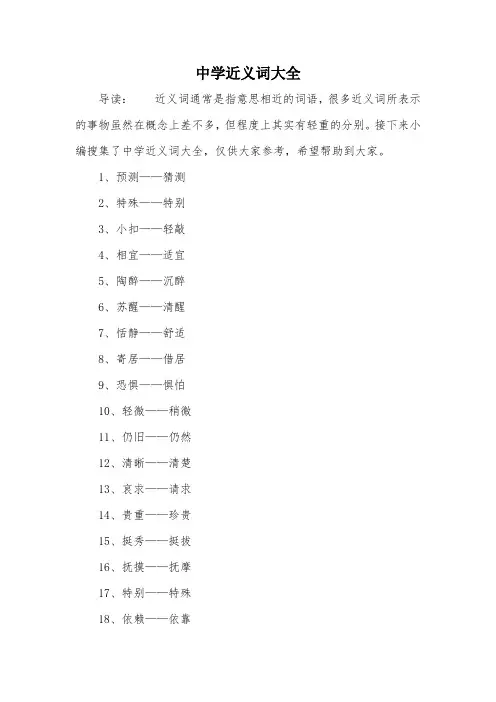
中学近义词大全导读:近义词通常是指意思相近的词语,很多近义词所表示的事物虽然在概念上差不多,但程度上其实有轻重的分别。
接下来小编搜集了中学近义词大全,仅供大家参考,希望帮助到大家。
1、预测——猜测2、特殊——特别3、小扣——轻敲4、相宜——适宜5、陶醉——沉醉6、苏醒——清醒7、恬静——舒适8、寄居——借居9、恐惧——惧怕10、轻微——稍微11、仍旧——仍然12、清晰——清楚13、哀求——请求14、贵重——珍贵15、挺秀——挺拔16、抚摸——抚摩17、特别——特殊18、依赖——依靠19、纯熟——熟练20、幽静——清幽21、陌生——生疏22、安顿——安置23、挽救——拯救24、天涯——天际25、颤动——颤抖26、自在——安闲27、打扮——妆扮28、管理——治理29、判断——判定30、捕获——捕捉31、温和——暖和32、惊奇——惊异33、简朴——简单34、增援——支援35、关键——要害36、疲劳——疲惫37、惊疑——惊奇38、审视——审阅39、愣住——停住40、眺望——远望41、防备——防御42、抵挡——抵抗43、挖苦——讥讽44、疑惑——迷惑45、夸耀——炫耀46、轻蔑——轻视47、强盛——强大48、侮辱——欺侮49、严肃——严厉50、清澈——清亮51、打扰——打搅52、形状——外形53、悄悄——静静54、温和——温顺55、暴躁——急躁56、灌溉——浇灌57、淹没——沉没58、冲毁——冲垮59、灾害——灾难60、胜负——胜败61、气愤——生气62、告别——离别63、如果——假如64、准备——预备65、耀眼——刺眼66、光芒——光线67、美丽——漂亮68、洁白——雪白69、惊奇——惊异70、中央——中心71、宽阔——宽广72、矗立——耸立73、优美——美丽74、新颖——新奇75、庄严——庄重76、挣脱——摆脱77、舒服——舒适78、笑容——笑脸79、茂盛——繁茂80、长处——优点81、诚实——老实82、注意——留意83、高兴——兴奋84、打碎——打坏85、用心——专心86、著名——有名87、准确——正确88、训练——练习89、严肃——严厉90、容易——轻易91、智慧——聪明92、气魄——气势93、雄伟——宏伟94、凝结——凝聚95、偶尔——偶然96、舒展——伸展97、生机——生气98、掠过——擦过99、奇特——奇异100、安谧——静谧101、温暖——暖和102、战役——战争103、情谊——友谊104、刚强——坚强105、侦探——侦察106、看守——看管107、焦急——焦虑108、崎岖——坎坷109、温和——温顺110、劫难——灾难111、防备——预防112、无端——无故113、祭祀——祭奠114、允许——答应115、希奇——希罕116、家景——家境117、严峻——严重118、思索——思考119、镇定——镇静120、严峻——严肃121、糟蹋——糟践122、奇怪——希奇123、掌握——把握124、犹如——如同125、徐徐——渐渐126、凝视——注视127、环游——周游128、模仿——模拟129、吓唬——恐吓130、疲倦——倦怠131、惬意——舒服132、兴趣——爱好133、痛快——愉快134、继承——继续135、赏给——赐给136、挚友——好友137、感触——感慨138、寻常——平常139、信奉——信仰140、宣布——公布141、相称——相当142、违背——违反143、惊讶——惊奇144、赠送——赠予145、充满——布满146、特殊——非凡147、海内——国内148、垂头丧气——没精打采149、全神贯注——聚精会神150、纤尘不染——一尘不染151、无边无涯——无边无际152、迷迷糊糊——模模糊糊153、情不自禁——不由自主154、赏心悦目——心旷神怡感谢您的阅读,本文如对您有帮助,可下载编辑,谢谢。
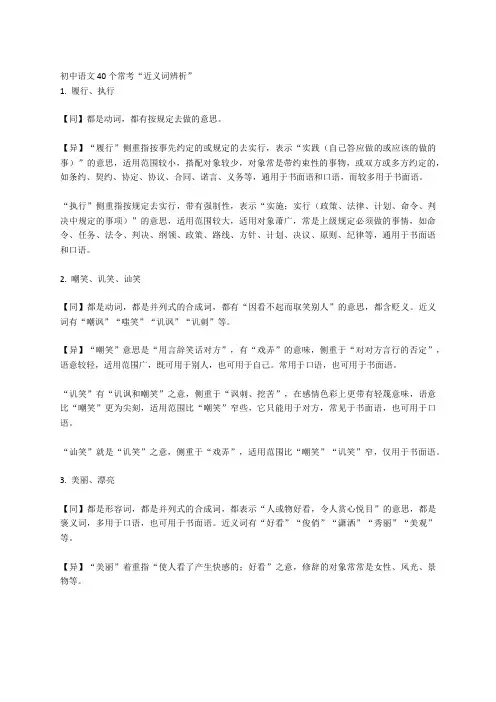
初中语文40个常考“近义词辨析”1. 履行、执行【同】都是动词,都有按规定去做的意思。
【异】“履行”侧重指按事先约定的或规定的去实行,表示“实践(自己答应做的或应该的做的事)”的意思,适用范围较小,搭配对象较少,对象常是带约束性的事物,或双方或多方约定的,如条约、契约、协定、协议、合同、诺言、义务等,通用于书面语和口语,而较多用于书面语。
“执行”侧重指按规定去实行,带有强制性,表示“实施;实行(政策、法律、计划、命令、判决中规定的事项)”的意思,适用范围较大,适用对象萧广,常是上级规定必须做的事情,如命令、任务、法令、判决、纲领、政策、路线、方针、计划、决议、原则、纪律等,通用于书面语和口语。
2. 嘲笑、讥笑、讪笑【同】都是动词,都是并列式的合成词,都有“因看不起而取笑别人”的意思,都含贬义。
近义词有“嘲讽”“嗤笑”“讥讽”“讥刺”等。
【异】“嘲笑”意思是“用言辞笑话对方”,有“戏弄”的意味,侧重于“对对方言行的否定”,语意较轻,适用范围广,既可用于别人,也可用于自己。
常用于口语,也可用于书面语。
“讥笑”有“讥讽和嘲笑”之意,侧重于“讽刺、挖苦”,在感情色彩上更带有轻蔑意味,语意比“嘲笑”更为尖刻,适用范围比“嘲笑”窄些,它只能用于对方,常见于书面语,也可用于口语。
“讪笑”就是“讥笑”之意,侧重于“戏弄”,适用范围比“嘲笑”“讥笑”窄,仅用于书面语。
3. 美丽、漂亮【同】都是形容词,都是并列式的合成词,都表示“人或物好看,令人赏心悦目”的意思,都是褒义词,多用于口语,也可用于书面语。
近义词有“好看”“俊俏”“潇洒”“秀丽”“美观”等。
【异】“美丽”着重指“使人看了产生快感的;好看”之意,修辞的对象常常是女性、风光、景物等。
“漂亮”着重指“好看、美观;出色”的意思,修辞的对象男女均可,还可用于动物、服饰、用具、建筑物等。
另外,“美丽”有“美好、高尚”的意思,而“漂亮”没有;“漂亮”有“表面好看但不能兑现的东西”之意,而“美丽”没有。
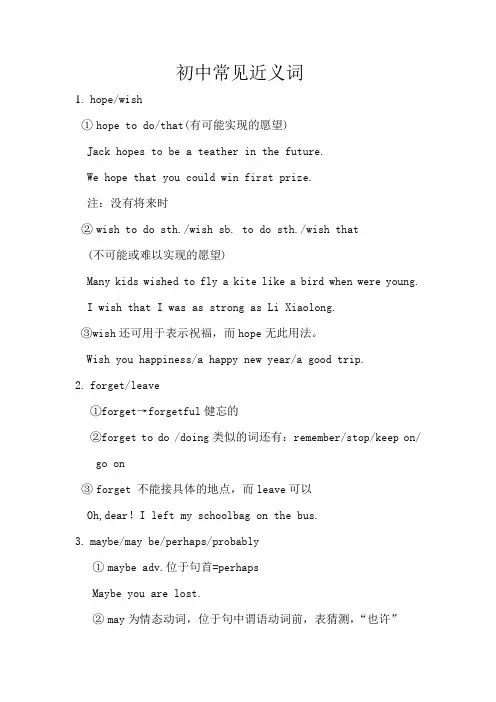
初中常见近义词1.hope/wish①hope to do/that(有可能实现的愿望)Jack hopes to be a teather in the future.We hope that you could win first prize.注:没有将来时②wish to do sth./wish sb. to do sth./wish that(不可能或难以实现的愿望)Many kids wished to fly a kite like a bird when were young.I wish that I was as strong as Li Xiaolong.③wish还可用于表示祝福,而hope无此用法。
Wish you happiness/a happy new year/a good trip.2.forget/leave①forget→forgetful健忘的②forget to do /doing类似的词还有:remember/stop/keep on/go on③forget 不能接具体的地点,而leave可以Oh,dear!I left my schoolbag on the bus.3.maybe/may be/perhaps/probably①maybe adv.位于句首=perhapsMaybe you are lost.②may为情态动词,位于句中谓语动词前,表猜测,“也许”may be是由情态动词may+be构成What he said may be right.③maybe/may be可以互换Maybe Kate is the best choice for the speech contest=Kate may be the best choice for…….④perhaps⑤probably4.although/though/but5.hardly/most/mostly/almost/nearly①hardly“几乎不”常用any连用。
中学生近义词辨析1、【爱护爱惜】爱护:有精心保护,不使受到损坏或伤害的意思。
如“爱护公物”。
爱惜:指不浪费,不糟蹋。
如“爱惜粮食”2、【安置安顿安排】安置:重在“置”,使工作、生活、物品等有适当的位置,或指对人或物的处置各得其所。
如“安置人员”、“安置行李”等。
安顿:重在“顿”,妥当安排使有着落。
如“安顿住处”等安排:重在“排”,分轻重缓急、先后主次,有条不紊地处置人或事物,多指人、事、任务等的处理。
如“安排任务”等。
3、【包含饱含包涵】三者都有含有的意思,但含有的浓度或对象不同。
包含:仅指里边含有,如“这句话包含好几层意思”。
饱含:指所含的量特别充足,如“饱含着深厚的阶级感情”。
包涵:指客套话请人原谅,如“唱得不好,请大家多多包涵”。
5、【爆发暴发】爆发:①指岩浆突然冲破地壳,向外迸出,如“火山爆发”;②指通过外部冲突而发生的质变,如“爆发革命”;③指力量、情绪等忽然发作,或事变突然发生,如“会场里爆发出雷鸣般的掌声”。
暴发:①指突然发作,如“山洪暴发”;②指突然发财得势,多含贬义,如“暴发户”。
6、【变换变幻】两者都是动词,都有变化之意。
变换:指事物的一定形式或内容换成另一种,多指具体的事物,如“变换一下位置”。
变幻:指不规则地改变,多指抽象的事物,如“世界上的政治风云变幻莫测”。
7、【不耻不齿】不齿:是不愿意提到的意思,如“出卖师友者,君子不齿”。
不耻:是不感到羞耻的意思,如“身居显位,却有如此贪心,别人尚羞,他自己却不耻”。
8、【部署布置】二者都与安排有关事情有关。
部署:指安排、布置人力、任务等,一般指大规模地、全面地、原则地安排配置,如“指挥员的正确部署来源于正确的决心”。
布置:指在一些活动中作出安排,多指具体的安排、配置等,如“布置工作”,“布置任务”。
9、【充斥充满】充斥:指到处都塞满,带厌恶色彩,是贬义词。
充满:泛指填满或充分具有,可指具体事物。
10、【篡改窜改】二者都有改动的意思,但改动的对象和动机不同。
初中语文近义词辨析1. 履行、执行【同】都是动词,都有按规定去做的意思。
【异】“履行”侧重指按事先约定的或规定的去实行,表示“实践(自己答应做的或应该的做的事)”的意思,适用范围较小,搭配对象较少,对象常是带约束性的事物,或双方或多方约定的,如条约、契约、协定、协议、合同、诺言、义务等,通用于书面语和口语,而较多用于书面语。
“执行”侧重指按规定去实行,带有强制性,表示“实施;实行(政策、法律、计划、命令、判决中规定的事项)”的意思,适用范围较大,适用对象萧广,常是上级规定必须做的事情,如命令、任务、法令、判决、纲领、政策、路线、方针、计划、决议、原则、纪律等,通用于书面语和口语。
2. 嘲笑、讥笑、讪笑【同】都是动词,都是并列式的合成词,都有“因看不起而取笑别人”的意思,都含贬义。
近义词有“嘲讽”“嗤笑”“讥讽”“讥刺”等。
【异】“嘲笑”意思是“用言辞笑话对方”,有“戏弄”的意味,侧重于“对对方言行的否定”,语意较轻,适用范围广,既可用于别人,也可用于自己。
常用于口语,也可用于书面语。
“讥笑”有“讥讽和嘲笑”之意,侧重于“讽刺、挖苦”,在感情色彩上更带有轻蔑意味,语意比“嘲笑”更为尖刻,适用范围比“嘲笑”窄些,它只能用于对方,常见于书面语,也可用于口语。
“讪笑”就是“讥笑”之意,侧重于“戏弄”,适用范围比“嘲笑”“讥笑”窄,仅用于书面语。
3. 美丽、漂亮【同】都是形容词,都是并列式的合成词,都表示“人或物好看,令人赏心悦目”的意思,都是褒义词,多用于口语,也可用于书面语。
近义词有“好看”“俊俏”“潇洒”“秀丽”“美观”等。
【异】“美丽”着重指“使人看了产生快感的;好看”之意,修辞的对象常常是女性、风光、景物等。
“漂亮”着重指“好看、美观;出色”的意思,修辞的对象男女均可,还可用于动物、服饰、用具、建筑物等。
另外,“美丽”有“美好、高尚”的意思,而“漂亮”没有;“漂亮”有“表面好看但不能兑现的东西”之意,而“美丽”没有。
初中语文-常见常用近义词辨析(十七)几乎:强调的语气轻一些,只表示相差之微小。
简直:带夸张或强调语气,强调相差微小或几乎相同,接近于完全、等于。
机密:重要而秘密,或批重要而秘密的事情。
多用于庄重的场合。
秘密:非公开,或非公开的事情。
有时引申指自然界或社会上尚未揭露的、尚未发现的事物。
多用于一般场合。
机体:生命个体的总称,如加速机体的新陈代谢。
肌体:身体,常比喻组织机构。
激烈:着重指运动紧张或双方斗争尖锐,达到很高的程度。
还常形容争论、辩论、竞争、搏斗等。
剧烈:着重指急剧,变动或刺激厉害。
还常形容药性、疼痛等。
猛烈:着重指来势急而猛,还常形容风雨、爆炸、响声、攻击、冲击等。
强烈:着重指强而有力,也指程度高、浓度大。
使用范围较大,能形容光线、色彩、气味、表现、对比、反映等客观事物,也能形容欲望、愿望、感情、要求等。
即刻:同为表示紧接着某个时候。
很短的时间。
能用在动词前面。
马上:所表示的时间有一定的伸缩性,可长可短,能用于未来时,表示即将。
还能用于数量词前面。
多用于口语。
立刻:所表示的时间伸缩性很小,用以表示即将时,所指的时间也很短。
立即:同立刻,多用于书面语中。
即刻:同立刻,多用于口语中。
立时:跟立刻基本相同,但较少使用。
语气比立刻稍轻。
极力:非常用力,以达到预期目的。
极力:极其用力。
程度很重。
竭力:用尽所有的力量。
程度更重,常说尽心竭力。
尽力:用一切力量。
程度较轻。
常说尽力而为。
还可以作动词,意为拿出一切力量。
语义比努力重。
努力:多指长时间不断地尽量使出力量,程度较轻。
驾驶:控制,使行进。
一般指操纵,使行驶。
对象是具体的,如机动车辆、船只等。
驾驭:也作驾御,能指驱使车马行进,也能用于抽象意义,泛指控制、支配并使服从自己的意志。
对象可以是抽象或具体的。
既而:时间副词,着重指前后两件事发生的时间相隔不久,一般单用。
继而:关联副词,前后两事紧紧相连常与始而、先是搭配。
艰苦(艰苦卓绝):艰难困苦,适用于环境、生活、岁月等客观条件。
七年级语文复习常用近义词
气息——气味凝望——注视依然——仍然芬芳——芬香蕴含——蕴藏轻盈——轻快宛若——仿佛欢悦——喜悦静谧——安静俏丽——美丽迷惑——疑惑勤勉——勤奋赋予——给予雕琢——雕刻绵亘——绵延勉励——鼓励控制——操纵争持——争论要挟——挟制竣工——完工回击——还击赞叹不已——赞不绝口真挚——真诚忍耐——容忍端详——凝视笑呵呵——笑哈哈峻拔——陡峭百折不回——百折不挠铭记——牢记沉思——深思顾惜——爱惜探望——探视抱怨——埋怨心惊肉跳——胆颤心惊宽厚——憨厚疑惑——困惑刻骨铭心——终生难忘往常——以往郑重——慎重沮丧——懊丧蹑手蹑脚——轻手轻脚介意——在意着迷——沉醉难过——难受立刻——立即谋面——见面慷慨——大方渺小——微小节制——控制恩赐——赏赐威胁——恐吓遨游——漫游著名——闻名特意——特别投身——投入流连忘返——恋恋不舍体验——感受养育——培育圣洁——神圣眷恋——眷念宝贵——珍贵宏伟——雄伟领悟——领会凶猛——猛烈无端——无故稀奇——稀罕允许——答应许愿——许诺团聚——团员悔恨——懊悔忍受——忍耐羞愧——惭愧严肃——严厉此项——和蔼殷勤——热情踌躇——犹豫颓唐——颓废憎恶——憎恨告别——分别呼唤——呼喊储备——贮存不甘落后——不甘示弱千方百计——想方设法排山倒海——翻江倒海阵亡——牺牲亢奋——兴奋焦躁——急躁浴血搏杀——浴血奋战清脆——清亮孤零零——孤单单徒劳——白费缘故——原因纯熟——熟练苏醒——清醒幽静——清幽陶醉——沉醉恬静——恬适陌生——生疏探访——访问陈列——排列哀伤——悲伤朴素——朴实溺爱——宠爱柔弱——虚弱目不忍视——目不忍睹竟然——居然。
同义词A 爱慕—喜爱安然—安稳遨游—游览奥秘—神秘懊悔—后悔B 报酬—酬劳悲哀—悲伤崩塌—倒塌必然—必定避免—幸免便宜—廉价哺育—培育C 猜测—推测才干—才能采用—采纳诧异—惊诧颤动—抖动沉浸—沉醉惩罚—惩处迟延—拖延耻笑—讥笑炽热—酷热憧憬—向往酬谢—答谢啜泣—抽泣创造—制造绰号—外号慈悲—慈善慈祥—慈爱葱茏—葱郁聪明—聪慧催促—督促璀璨—明亮D 打扮—装扮打搅—打扰胆怯—害怕淡忘—忘却调皮—淘气叮嘱—嘱咐陡崖—悬崖妒忌—嫉妒对付—应付对照—对比E 恩赐—赏赐F 发布—公布发誓—宣誓发展—进展繁殖—生殖反抗—抵抗防御—防备妨碍—阻碍分量—重量分外—格外愤怒—愤慨锋利—锐利服侍—侍侯浮现—出现赋予—给予G 告别—告辞恭敬—尊敬估计—估量鼓励—鼓舞固然—当然故意—有意关心—关怀管理—治理贯通—贯穿瑰宝—珍宝H 含糊—模糊寒冷—严寒和蔼—和气宏伟—雄伟欢跃—喜悦环绕—围绕荒芜—荒凉回顾—回忆汇集—汇合获取—猎取祸患—祸害J 机灵—灵巧积累—积存即将—马上疾驰—飞奔寄托—寄予讥笑—嘲笑坚固—牢固坚毅—坚强艰苦—艰难艰难—困难建造—建筑交织—交错娇嫩—柔嫩节制—克制竭力—尽力解救—拯救谨防—防备谨慎—慎重惊险—危险精密—周密精致—精巧敬仰—仰慕境界—境地居然—竟然绝望—无望K 开辟—开发开辟—开拓慷慨—大方可惜—惋惜空暇—空闲恐怖—恐惧控制—操纵款待—招待愧疚—内疚L 劳苦—劳累冷艳—艳丽黎明—拂晓立即—马上灵便—灵活领略—领会浏览—扫瞄隆重—盛大沦陷—沦落罗列—排列M 满意—中意漫步—闲逛茂密—茂盛朦胧—模糊弥漫—布满密切—紧密勉励—鼓励勉强—牵强藐视—轻视泯灭—消灭明丽—明媚明艳—鲜艳摹仿—模仿蓦地—突然模范—榜样N 鸟瞰—俯视凝结—凝聚凝视—注视挪移—移动O 偶尔—间或P 判断—推断批评—批判疲惫—疲乏疲倦—疲乏僻静—偏僻漂亮—美丽飘荡—漂浮飘拂—漂动品格—品行平生—终生平庸—平凡平整—平坦普通—一般Q 欺凌—凌辱奇妙—奇异歧视—卑视气魄—气势气势—气概启示—启发清晰—清楚乾坤—天地潜伏—埋伏谴责—责备惬意—满意亲密—亲热轻蔑—轻视轻盈—轻快清澈—清亮清纯—纯洁清晰—清楚驱赶—驱逐R 弱小—微小S 伤害—损害商议—商量商议—协商稍微—略微奢靡—奢侈神秘—神奇神奇—奇妙神奇—奇特审阅—批阅实用—有用舒畅—舒服思量—思考伺侯—侍奉肃静—安静素质—素养率先—领先T 贪婪—贪欲探索—探究逃避—躲避特殊—特别誊写—抄写体面—风光体味—体会推荐—推举妥帖—稳妥W 蜿蜒—曲折顽强—坚韧顽强—顽固宛然—仿佛宛如—犹如宛若—仿佛宛若—宛如巍峨—雄伟惟独—只有危急—危险尾随—跟随委托—托付温和—和气温和—温柔X 吸收—汲取希翼—希望稀罕—希奇袭击—突击吓唬—恐吓鲜明—鲜亮羡慕—艳羡向来—一直消失—消逝歇息—休息欣赏—观赏新鲜—新奇兴旺—兴盛兴许—或许凶猛—凶狠雄伟—宏伟修筑—修建羞愧—惭愧秀媚—秀丽徐徐—缓缓寻常—平常寻觅—寻找Y 延续—连续严重—严峻遥望—眺望要挟—挟制依然—依旧游览—巡游黝黑—乌黑幼稚—稚嫩预计—估计愿意—情愿允许—同意Z 暂时—临时阻挠—阻止赞赏—欣赏赞叹—赞美责怪—责备占领—占据照射—照耀照应—照顾珍贵—宝贵镇静—冷静征服—制服拯救—挽救争执—争吵指望—盼望骤然—突然注视—凝视追寻—寻找捉弄—戏弄茁壮—健壮滋味—味道纵情—尽情阻塞—堵塞别具一格—独具匠心不可计数—不计其数风俗世情—风土人情毫不犹豫—坚决果断绞尽脑汁—费尽心机筋疲力尽—力倦神疲迥乎不同—绝然不同举世闻名—闻名遐迩聚精会神—全神贯注雷霆万钧—排山倒海络绎不绝—川流不息眉开眼笑—眉飞色舞目不转睛—聚精会神排山倒海—移山倒海疲惫不堪—筋疲力竭千磨万击—千锤百炼情不自禁—不由自主盛气凌人—不可一世随心所欲—为所欲为同心协力—同心同德无拘无束—自由自在喜不自胜—乐不可支腥风血雨—凄风苦雨一五一十—如数家珍依依不舍—恋恋不舍应有尽有—无奇不有朝夕与共—朝夕相处震耳欲聋—响彻云霄反义词胖—瘦香—臭明—暗忙—闲凉—暖来—去尖—钝好—坏轻—重前—后左—右是—非有—无老—少深—浅高—低快—慢升—降入—出开—关斜—正落—升冷—热饿—饱贫—富死—活穷—富买—卖旧—新细—粗明—暗首—尾始—终洁白—漆黑美丽—丑陋仔细—马虎告别—会合舒服—难受粗心—细心出发—归来安宁—喧闹宽敞—狭窄困难—容易热闹—寂静空闲—忙碌打开—关闭流动—固定暖和—寒冷弯曲—笔直微笑—悲伤昂首—低头开始—结束现在—将来喜欢—讨厌欢快—沉重机灵—愚笨明白—糊涂希望—失望傍晚—清晨秘密—公开高大—矮小坚定—动摇张开—合拢经常—偶尔愤怒—高兴坚定—犹豫清楚—模糊熟悉—陌生保护—破坏勇敢—懦弱聪明—愚蠢失败—成功敞开—关闭飞快—缓慢明白—糊涂失败—成功烦恼—高兴特殊—一般特别—普通漂亮—丑陋高兴—伤心仔细—粗心精彩—枯燥洁净—肮脏心爱—厌恶飞快—缓慢极小—极大温和—暴躁好事—坏事奔跑—停止灾害—幸福坚硬—松软堵塞—畅通贵重—便宜锋利—迟钝聚集—分散新鲜—陈旧破碎—完整未来—现在诚实—狡猾可爱—可恨活泼—呆板赶紧—拖延透明—浑浊凉爽—炎热永远—短暂凉爽—闷热广阔—狭小相信—怀疑裂开—合拢相信—怀疑节省—浪费亲密—疏远高明—低劣热闹—冷清喜欢—讨厌茁壮—虚弱得意洋洋—垂头丧气人声鼎沸—鸦雀无声不可计数—屈指可数生气勃勃—死气沉沉呼风唤雨—息事宁人坚固—松散凝结—离散陡峭—平坦伟大—渺小精美—粗俗温顺—凶猛沸腾—沉寂壮丽—晦暗呈现—消失静寂—嘈杂便宜—昂贵迟钝—敏捷兴奋—忧愁美丽—丑陋天堂—地狱模糊—清晰羡慕—不屑朦胧—清晰凶猛—温柔不识—相识舒服—难受弯曲—笔直懒惰—勤快宽裕—拮据隐藏—公开平坦—坎坷柔弱—坚强干燥—潮湿古老—现代故人—新交蜿蜒—笔直凝结-溶解增长—减短崭新—陈旧静谧—吵闹简单—复杂勇猛—怯懦附近—遥远寒冷—温暖温柔—凶恶尽职—失职轻盈—笨重隐隐约约—清清楚楚明—暗此—彼朝—暮闲-忙紧—松伸—缩扩散(聚集)微波(巨浪)聚集(分散)明艳(暗淡)蜿蜒(笔直)善良(凶恶)精湛(生疏)马虎(认真)生疏(熟练)卓越(普通)伟大(渺小)稀(密)朴实(华丽)安全(危险)冷淡(热情)伤害(保护)踌躇(果断)松散(紧凑)频繁(稀少)减产(增产)下降(上升)破坏(保护)容易(困难)灵巧(笨重)敏锐(迟钝)揭开(覆盖)立刻(迟缓)清楚(模糊)宽敞(狭窄)平衡(倾斜)提高(降低)沉寂(喧闹)黝黑(白皙)和平(战争)流畅(阻塞)坚强(柔弱)歪歪斜斜-端端正正枝繁叶茂-枯枝败叶垂头丧气-昂首挺胸迷惑不解-恍然大悟遵从(违反)骄傲(谦虚)完整(残缺)坚硬(柔软)糟蹋(爱惜)有限(无限)失望(希望)开阔(狭窄)清晰(模糊)温暖(寒冷)明白(疑惑)朴素(华丽)独特(普通)微弱(强烈)漆黑(明亮)消失(出现)责备(表扬)公开(秘密)固执(随和)特别(一般)明亮(暗淡)细致(粗糙)舒畅(难受)疑惑(明白)坚毅(动摇)容易(困难)成功(失败)悲惨(幸福)违抗(遵从)纯洁(混浊)错误(正确)坚定(动摇)凶恶(善良)违背(遵从)明白(糊涂)聚拢(分散)偶尔(经常)俊俏(丑陋)乌黑(洁白)光滑(粗糙)轻快(沉重)漂浮(沉浸)静止(移动)匿藏(暴露)漆黑(光明)温柔(粗暴)明澈(混浊)悠闲(忙碌)自在(拘束)枯萎(茂盛)依赖(自立)从容(慌张)优美(丑陋)粗俗(文雅)承认(否定)朦胧(清晰)疲倦(充沛)焦急(耐心)放肆(拘束)漂亮(丑陋)违抗(服从)陌生(熟悉)幽静(喧闹)警惕(麻痹)惦记(放心)打消(产生)难过(高兴)骄傲(谦虚)紧张(轻松)关切(冷淡)喜欢(讨厌)真理(谬论)强健(瘦弱)清晰(模糊)沉醉(苏醒)鲜明(暗淡)清凉(燥热)仰望(俯视)歇息-工作平坦-陡峭善良-凶恶片刻-长久僵硬-柔软注视-扫视狰狞-慈祥贫瘠-肥沃强大-弱小遭殃-幸运温柔-粗暴敏感-迟钝变化莫测-一成不变荒无人烟-人烟稠密震耳欲聋-鸦雀无声前赴后继-畏缩不前批评-表扬担心-放心倔强-柔顺明白-糊涂相信-怀疑镇定-惊慌稀少-稠密狭窄-宽阔慌忙-从容毅然-犹豫方便-麻烦便宜-昂贵爱慕-厌恶合拢-张开昏暗-明亮维护-破坏损失-受益清晰-模糊暖-寒缓-急宽-窄甘-苦外-内先-后利-钝鬻-买闲-忙干燥-湿润精通-生疏温暖-寒冷痛苦-欢乐故意-无意防御-进攻温和-凶狠可爱-讨厌黑暗-光明悦耳-刺耳伤害-保护神奇-普通发展-落后拥有-失去吝啬-大方幼稚-成熟含糊-清楚严重-轻微毫不犹豫-犹豫不决理直气壮-理屈词穷心惊肉跳-镇定自若一丝不苟-马马虎虎茂密-稀疏灿烂-黯淡团结-分裂兴旺-衰败特殊-普通歧视-重视杰出-平庸恶劣-良好显赫-卑微迟延-提前惩罚-奖励魁梧-矮小增添-减少朴素-奢侈蔑视-尊重诚意-假意拒绝-接受示弱-逞强好心-恶意破碎-完整酥软-坚硬炎热-寒冷仔细-马虎聪明-愚蠢力倦神疲-精力充沛熙熙攘攘-冷冷清清完整无缺-支离破碎隐隐约约-清清楚楚空虚-充实伶俐-笨拙诚实-说谎狭窄-宽阔晦暗-明亮勇敢-懦弱宽容-狭隘简陋-豪华异常-平常魁梧-瘦弱精致-粗糙幸福-痛苦穷苦-富裕忧虑-放心蜷缩-伸直潮湿-干燥统一-分裂紧张-松弛寂寞-热闹危险-安全喜欢-讨厌繁荣-衰败淘气-老实大概-精确坚定-动摇忧伤-快乐漆黑-明亮节省-浪费寒冷-炎热悲伤-愉快俯-仰浮-沉饱-饥寒-暖隐-现漫不经心-全神贯注心平气和-暴跳如雷筋疲力尽-精神抖擞人声鼎沸-鸦雀无声垂头丧气-兴高采烈人山人海-寥寥无几愁眉紧锁-喜笑颜开不计其数-屈指可数持续-中断吃力-轻松凉爽-温暖消失-显现险峻-平缓茂盛-枯萎喧闹-寂静美丽-丑陋暴躁-温顺腼腆-大方减少-增加笨重-灵巧出色-一般熟悉-陌生骄傲-谦虚懦弱-坚强平静-动荡仪表-内心贫穷-富裕弯曲-笔直牢固-松散超常-失常沮丧-兴奋保护-破坏新鲜-腐烂集中-分散凝聚-分散粗糙-光滑藏匿-公开郑重-随意高昂-低落自在-拘束扩大-缩小柔和-严厉刚强-软弱出现-消失衰老-年轻淡雅-浓艳清醒-糊涂熟识-生疏伶俐-笨拙害羞-大方倾斜-竖直复杂-简单深沉-肤浅肯定-否定团结-分裂洒脱-拘谨明朗-阴沉迂回-径直残破-完整簇拥-分散陡峭-平缓热烈-平静沉着-惊慌坚强-脆弱崎岖-平坦严寒-酷暑慌忙-镇定安谧-嘈杂朴素-华丽健美-衰弱拘束-随便老实-狡猾个性-共性沉甸甸-轻飘飘深奥-浅显详细-简略贫瘠-肥沃敬佩-鄙视迅速-缓慢耐心-急躁名副其实-名不副实雪中送炭-雪上加霜歪歪斜斜-端端正正马马虎虎-认认真真扩散-集中综合-分解密切-疏远洪亮-低沉嘲笑-称赞遗憾-圆满盛气凌人-平易近人万古长青-昙花一现断断续续-连续不断目瞪口呆-谈笑自若重逢-离别偶尔-经常稀罕-平常寻常-特殊迅猛-缓慢慷慨-吝啬存在-消失朦胧-清晰浏览-精读冲锋-退却揳入-退出隐蔽-暴露精彩-糟糕放肆-谨慎及时-耽误快活-忧伤厄运-好运宠儿-弃儿指望-失望厌倦-喜爱平庸-优秀允许-禁止机灵-笨拙俊俏-丑陋漂浮-沉没精细-粗糙辽阔-狭小神奇-平庸特别-一般喜欢-讨厌黯淡-鲜亮关切-冷落真理-谬误开放-凋谢开放-封闭强壮-虚弱疑惑-坚信强盛-衰弱尊重-侮辱失信-守信坚强-软弱掩盖-揭露发掘-埋没承受-推却约莫-一定推测-断定镇定-紧张严寒-酷暑笨重-轻盈临时-长期严肃-活泼挺进-撤退湍急-平缓沉寂-喧闹抑制-张扬危险-安全清晰-浑浊漫不经心-专心致志垂头丧气-扬眉吐气同义词斜—歪脚—足肥—胖降—落找—寻心惊肉跳—胆战心惊丝毫未动—未动分毫祝愿—祝福茁壮—强壮召唤—呼唤嘱咐—叮嘱希望—盼望闪烁—闪耀希望—盼望袭击—攻击打扰—打搅暖和—温和拜访—访问艳丽—鲜艳节省—节约美丽—漂亮快乐—欢乐时光—时间惊讶—惊奇亲密—亲切依然—依旧高明—高超喜欢—喜爱热闹—喧闹开心—快乐举行—进行凉爽—凉快广大—广阔永远—永久消失—消灭饥荒—饥饿广阔—宽阔飞翔—飞行奇怪—惊奇眨眼—瞬间聚集—聚拢根据—依据诚实—老实未来—将来称赞—赞扬发现—发觉赶紧—抓紧快乐—高兴解落—降落波纹—波浪颤动—颤抖颤动—抖动破碎—破裂珍珠—珍宝财富—财宝锋利—锐利伤心—难过高兴—快乐连忙—赶忙拦住—挡住极小—微小漂浮—漂移平时—平常奔跑—奔驰温和—温顺灾害—灾难帮助—关心温和—亲切无数—很多愿意—同意立刻—连忙如果—假如仔细—认真传说—传奇目录—名目招聘—聘请洁净—干净特殊—特别聆听—倾听领袖—首领盼望—希望费力—费劲使劲—用劲救护—抢救挑选—选择本事—本领烦恼—苦恼究竟—毕竟拼命—舍命浪费—白费干净—洁净录取—录用聊天—谈天盼望—希望耽误—耽搁敞开—放开躲藏—隐藏胆量—胆识飞快—飞速比赛—竞赛害怕—可怕亲爱—友爱保护—爱护谢谢—感谢清楚—清晰渐渐—慢慢面颊—脸蛋脖子—颈项歌唱—唱歌寻找—查找拾起—捡起办法—方法告别—离别准备—预备洁白—雪白美丽—秀丽出发—动身观察—观看很多—许多宾客—来宾安宁—安静逃窜—逃跑突然—忽然宽阔宽敞热闹—吵闹住所—住宅闪现—出现寺庙—寺院卧室—卧房流动—流淌连忙—赶忙忽然—突然好似—好像连忙—急忙正要—刚要浮上—浮现辽阔—宽阔昂首—仰头眼力—视力故乡—家乡本事—本领劝告—劝说依赖—依靠何必—为必凭着—靠着机灵—机智奔走—奔跑秘密—隐秘专心—用心著名—闻名奇怪—惊奇发现—发明好象—仿佛有趣—有味愤怒—气愤坚定—坚决仍旧—照旧弯弯曲曲—曲曲折折连绵不断—连绵起伏赞不绝口—赞叹不已反义词前——后冷——热高——低进——退死——活公——私快——慢矛——盾宽——窄强——弱轻——重缓——急松——紧好——坏美——丑善——恶是——非闲——忙来——去分——合存——亡动——静浓——淡偏——正饥——饱爱——恨升——降开——关始——终胖——瘦迎——送盈——亏真——假虚——实有——无雅——俗是——否稀——密粗——细东——西巧——拙恩——怨新——旧正——邪通——堵止——行古——今张——弛曲——直亮——暗亲——疏收——放输——赢逆——顺苦——甜忠——奸纵——横得——失南——北薄——厚哭——笑文——武推——拉问——答主——仆买——卖深——浅聚——散干——湿彼——此生——熟单——双首——末你——我敌——友警——匪盛——衰胜——败加——减软——硬阴——阳顺——逆反——正祸——福信——疑错——对藏——露老——少断——续钝——锐浓——淡雌——雄醒——睡止——行咸——淡正——歪正常——异常非凡——平凡特别——一般扫兴——高兴轻蔑——敬重开心——苦闷寻常——异常违背——遵循怀疑——相信强盛——衰败尊重——侮辱激烈——平静嘈杂——寂静美丽——丑陋信奉——背弃失信——守信率领——追随退化——进化凝结——溶解伟大——渺小聚拢——分散增添——减少活泼——呆板鲜艳——暗淡严寒——酷暑安谧——嘈杂温暖——凉爽柔和——严厉拒绝——同意清醒——糊涂荒芜——耕种清晰——浑浊坚强——软弱微云——浓云纯熟——生疏陌生——熟悉平坦——崎岖光滑——粗糙慎重——随便喜欢——厌恶痛快——难受幽静——喧闹崎岖——平坦刚强——软弱慌忙——镇定熟识——生疏伶俐——笨拙怕羞——大方镇定——慌张团结——分裂羞涩——大方严寒——炎热洒脱——拘谨明朗——阴沉沉重——轻盈迂回——径直清澈——浑浊脆弱——坚强饱满——干瘪衰弱——强健犹豫——坚定丰收——歉收复杂——简单淡妆——浓抹相宜——不宜自在——拘束平常——奇特勤劳——懒惰喜欢——讨厌密集——稀疏胜利——失败挺进——撤退宽敞——狭窄倾斜——竖直闻名——无名认识——陌生有趣——乏味舒畅——苦闷结束——开始紧张——轻松整齐——纷乱安全——危险撒谎——诚实慈祥——凶恶可爱——可恶紧张——轻松仔细——粗心附近——远方赞许——反对淡水——咸水高兴——难过飞快——缓慢精彩——平淡笨重——轻便紧张——松弛有趣——乏味听从——违抗诚实——虚伪承认——否认高兴——伤心起劲——没劲简单——复杂容易——困难熟练——生疏准确——错误温和——严厉暴躁——温和近处——远处气愤——欢喜粗心——细心美丽——丑陋洁白——乌黑高兴——痛苦宽阔——狭窄新款——陈旧兴旺——衰败团结——分裂敏捷——迟钝危险——安全常常——偶尔幼稚——老练含糊——清楚严重——轻微茂密——稀疏光明——黑暗微弱——强大杰出——平庸恶劣——良好灿烂——暗淡特殊——普通异常——平常简陋——豪华诚意——假意理屈——理直拒绝——接受惩罚——奖励迟延——提前示弱——逞强好心——恶意破碎——完整酥软——坚硬炎热——寒冷诚实——撒谎仔细——马虎聪明——愚笨空虚——充实伶俐——笨拙狭窄——宽阔晦暗——明亮勇敢——懦弱宽容——严格表扬——批评一向——偶尔善良——凶恶寂静——热闹聪明——愚笨穷苦——富裕精致——粗糙健康——虚弱忧虑——放心糟糕——精彩潮湿——干燥喜欢——讨厌危险——安全寂寞——喧闹奴隶——主人紧张——松弛统一——分裂繁荣——衰败精致——粗糙权利——义务名副其实——名不副实雪中送炭——雪上加霜歪歪斜斜——端端正正风平浪静——狂风恶浪迷迷糊糊——清清楚楚全神贯注——心不在焉断断续续——连续不断赏心悦目——触目惊心一丝不苟——粗心大意力倦神疲——精力充沛万马奔腾——无声无息暖暖和和——冷冷清清吞吞吐吐——干干脆脆毫不犹豫——犹豫不决别具一格——普普通通熙熙攘攘——冷冷清清心惊肉跳——镇定自如理直气壮——理屈词穷一朝一夕——日久天长悔过自新——执迷不悟群策群力——孤掌难鸣废寝忘食——饱食终日沸沸扬扬——鸦雀无声翻来覆去——简单明了吵吵嚷嚷——冷冷清清唇枪舌剑——心平气和粗制滥造——精雕细刻安居乐业——颠沛流离。
近义词辨析1.【安适】【安详】在城市的大街小巷,我们时常可以看到老人们三五成群地凑在一起晒太阳、搓麻将、下棋,阳光洒在他们布满皱纹的脸上,看上去是那样从容而。
安适——强调环境舒适。
安详——多用来形容人的面容、举止。
2. 【包含】【包涵】中国是一个多民族国家,汉族、壮族、满族、苗族、彝族等56 个民族。
包含——指里边含有。
包涵——客套话,指请人原谅。
3. 【迸射】【迸发】【迸溅】把不满表达成上进,把委屈升华为不屈,把失意改写成冷峻。
从一时的压抑中酝酿出一生的执着,从一时的失意中出一生的激情。
迸射——强调射出的强烈。
迸发——主要强调发出的突然。
迸溅——主要用来指流体物质。
4. 【保障】【保证】社会危害性通过发挥其在刑事立法、刑事司法和刑法解释上的功能,具有人权的作用。
保障——强调保护生命、财产、权力等,使其不受侵犯和破坏;或作名词,指起保障作用的事物。
保证——指担保,确保既定的要求和标准不打折扣。
5.【必须】【必需】老师教育我们,答应别人的事情一定要做到并做好,如果做不到,要学会拒绝。
必须——副词,表示事理上和情理上的必要,有强调的语气,多作状语。
必需——动词,指一定要有的,不可缺少的。
6. 【变换】【变幻】纵观全球,政治风云莫测。
变换——事物的形式(内容)换成另一种,能带宾语。
变幻——事物的形式(内容)不规则或奇异地变化,不能带宾语。
7.【处事】【处世】他十分冷静,好几次都帮我们渡过了难关。
处事——处理事务。
处世——在社会上活动,与人相处交往。
8.【沉浸】【沉湎】新年联欢晚会上,同学们载歌载舞,大家都在欢快、热闹的氛围中。
沉浸——多比喻人处在某种气氛或思想活动中。
沉湎——沉溺,表示不能自拔。
比“沉浸”的程度深。
9. 【承载】【承担】传统书信了太多的文化内涵,一封信,就是一份沉甸甸的敬意。
承载——承受,装载;也可作“继承”来讲。
承担——担负,担当。
10. 【筹备】【筹办】为开展新年联欢晚会,各项工作都在有序地进行着。
初中常见近义词
1.hope/wish
①hope to do/that(有可能实现的愿望)
Jack hopes to be a teather in the future.
We hope that you could win first prize.
注:没有将来时
②wish to do sth./wish sb. to do sth./wish that
(不可能或难以实现的愿望)
Many kids wished to fly a kite like a bird when were young.
I wish that I was as strong as Li Xiaolong.
③wish还可用于表示祝福,而hope无此用法。
Wish you happiness/a happy new year/a good trip.
2.forget/leave
①forget→forgetful健忘的
②forget to do /doing类似的词还有:remember/stop/keep on/
go on
③forget 不能接具体的地点,而leave可以
Oh,dear!I left my schoolbag on the bus.
3.maybe/may be/perhaps/probably
①maybe adv.位于句首=perhaps
Maybe you are lost.
②may为情态动词,位于句中谓语动词前,表猜测,“也许”
may be是由情态动词may+be构成
What he said may be right.
③maybe/may be可以互换
Maybe Kate is the best choice for the speech contest
=Kate may be the best choice for…….
④perhaps
⑤probably
4.although/though/but
5.hardly/most/mostly/almost/nearly
①hardly“几乎不”常用any连用。
但不可用no,nearly,nobody 等否定词连用。
hardly any+n复数/n不可数=almost+n复数/n不可数
hardly a +n单数=almost+no+n单数
There are harddly any books on the shelf.
There are almost no books on the shelf.
There is hardly a cloud in the sky.
There is almost no cloud in the sky.
②most adj./adv.→the most a most=very
She is the most beatiful girl in our school.
She is a most/very beautiful girl in our school.
most adv.much的最高级;修饰动词
I like summer most.
③mostly“大部分地”主要修饰be/介词短语
The students in our class are mostly girls.
I get up early every day,mostly on weekends.
④almost”几乎,差不多”后面接any/no/never,none,nothing, nobody,every,everyboay,everything……还常跟数词。
但almost 不与not连用。
He had almost nothing to do that day.
Almost every student has come.
Almost everything likes the film.
The watch cost me almost 20 yuan.
She had almost no money.(对)
She had almost not money.(错)
注意:almost还可表示“差一点”修饰动词,形容词或名词。
I almost fell off my bike.
The car almost knocked the tree.
He is almost right.
④nearly”几乎,差不多”语气比almost弱,nearly不与……那
些表否定的代词(any,no,never,none……)连用,但修饰时间词,数量词,和年龄词时,nearly/almost都可以。
在not,prety,very后只用nearly.
The car hit child very nearly.
6.look after/take care of/be careful
①look after well=take good care of
Look after yourself when you are away from here.
We should take good care of the old.
②take care=be careful=look out”小心,注意”
Take care!The water is very hot.
7.be good for/at/to
①be good for对……有益→be bad for
Reading is good for us but reading in the sun is bad for our eyes.
②be good at=do well in→be weak in
Tom is good at singing while his brother does well in art.
I am a little weak in math.
③be ggod to 对……友好=be kind/friendly to
Jay is good to everyone around.
8.make/let/have/help
①make/let/have/help sb. do sth.
We made/let/had/helped Zhang Li sing the English song Yesterday Once More for us.
②have/get sth.done
I must have/get my homework finished every day.
9.spend/pay/cost/take
①。